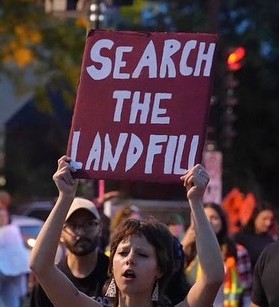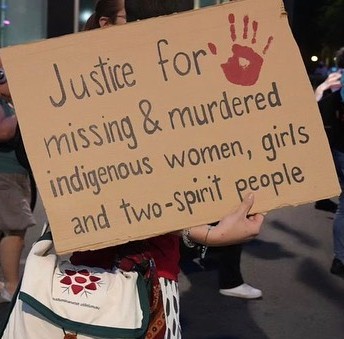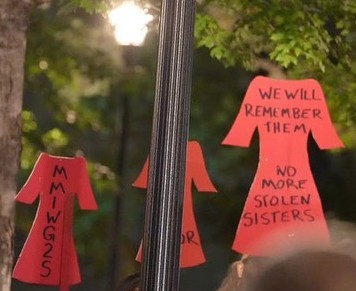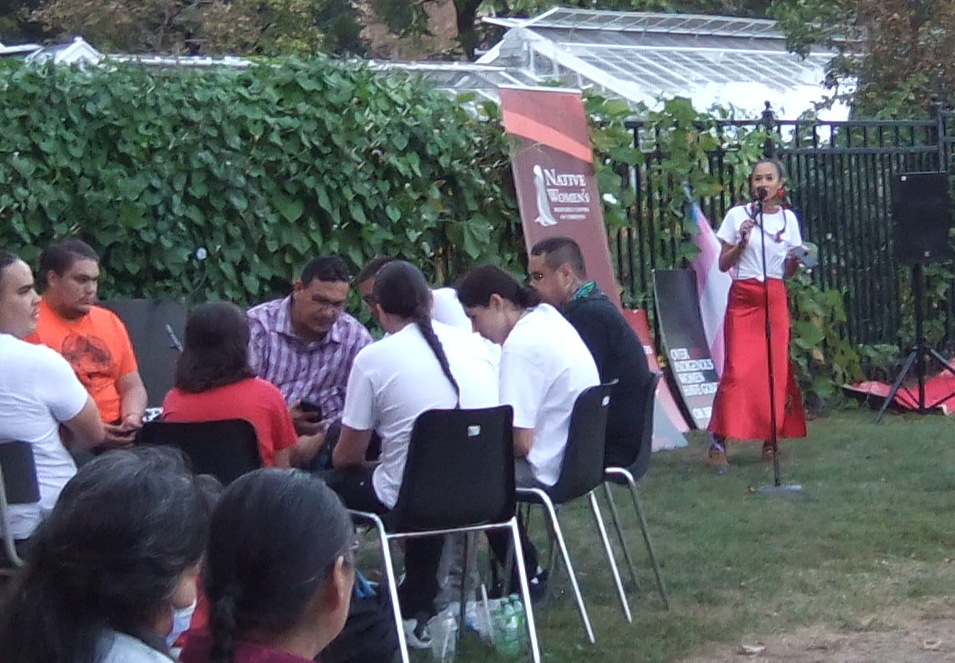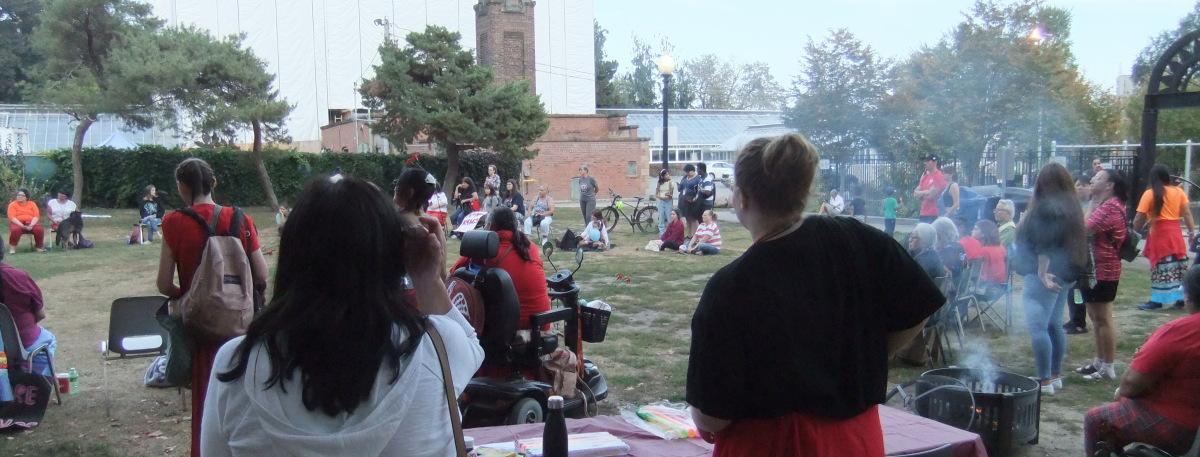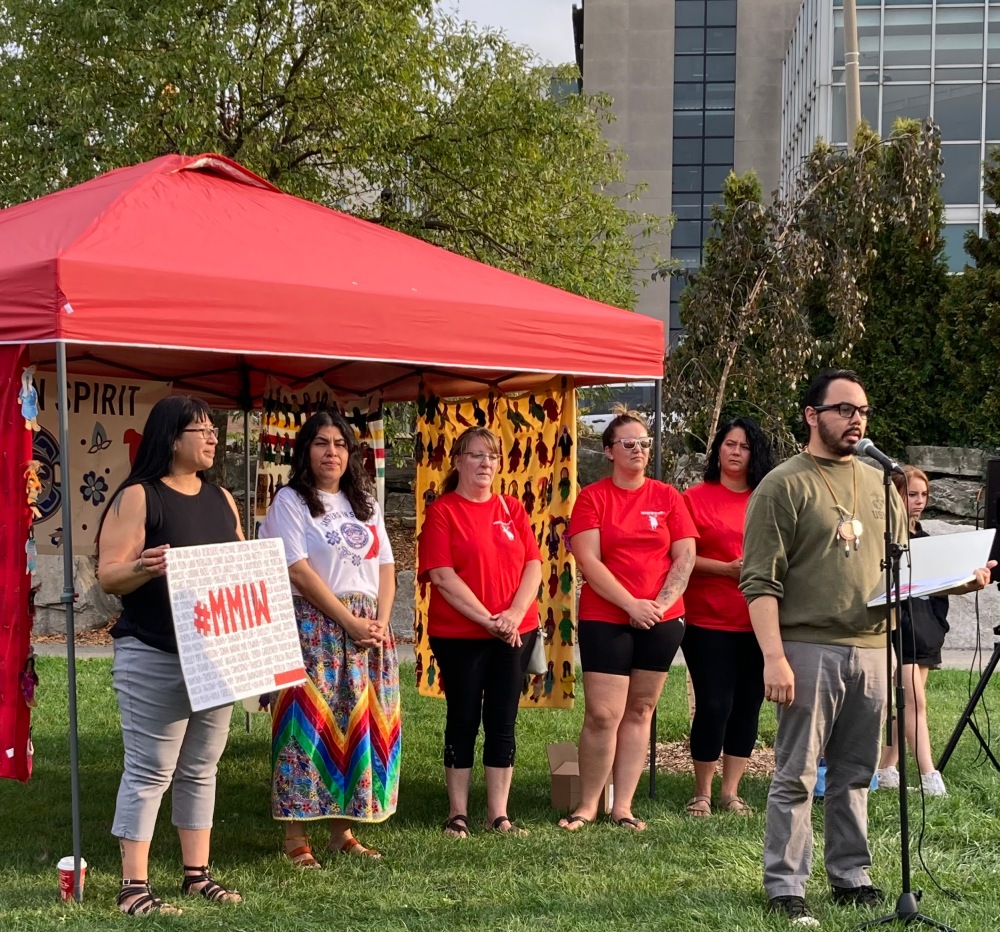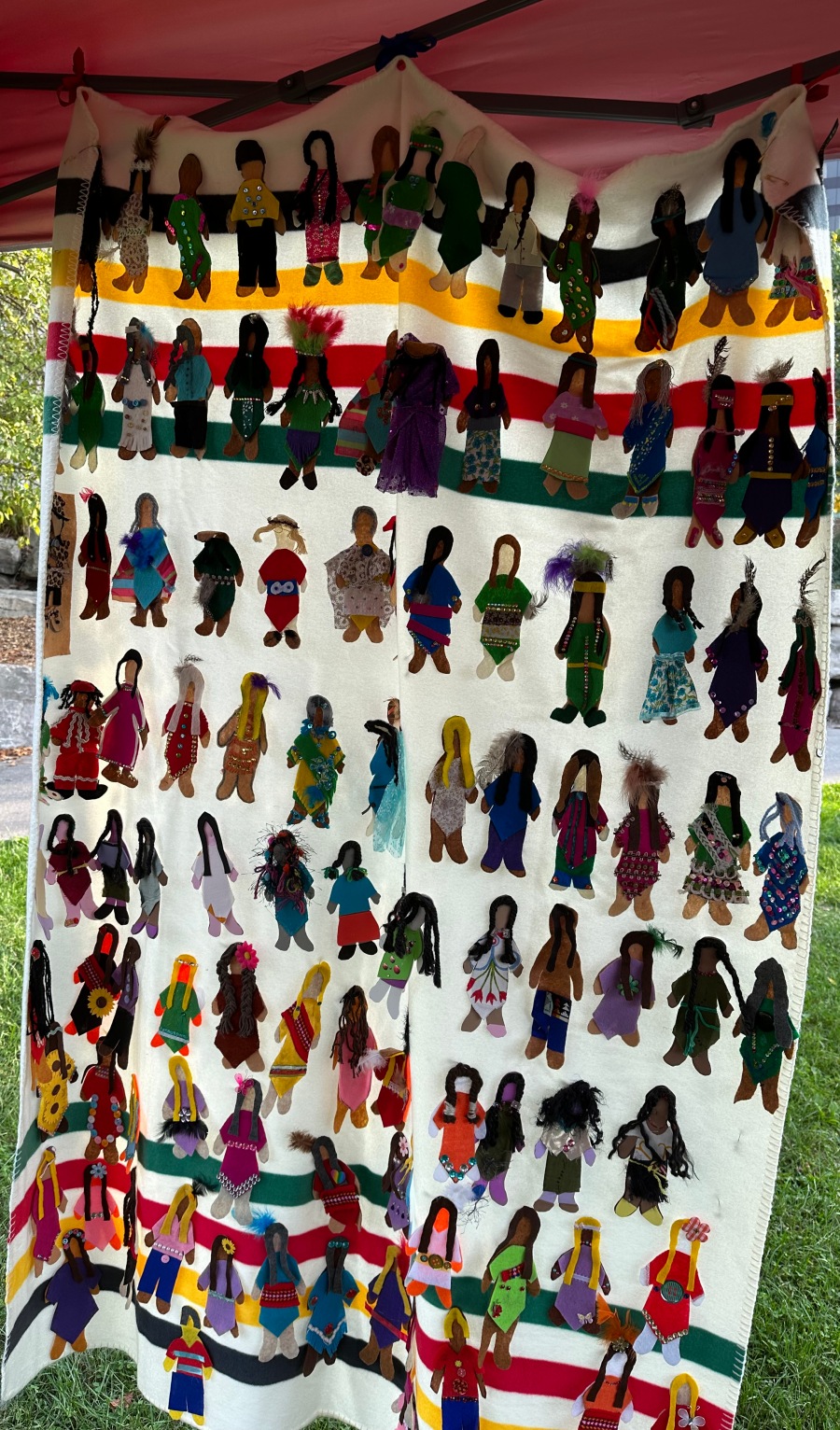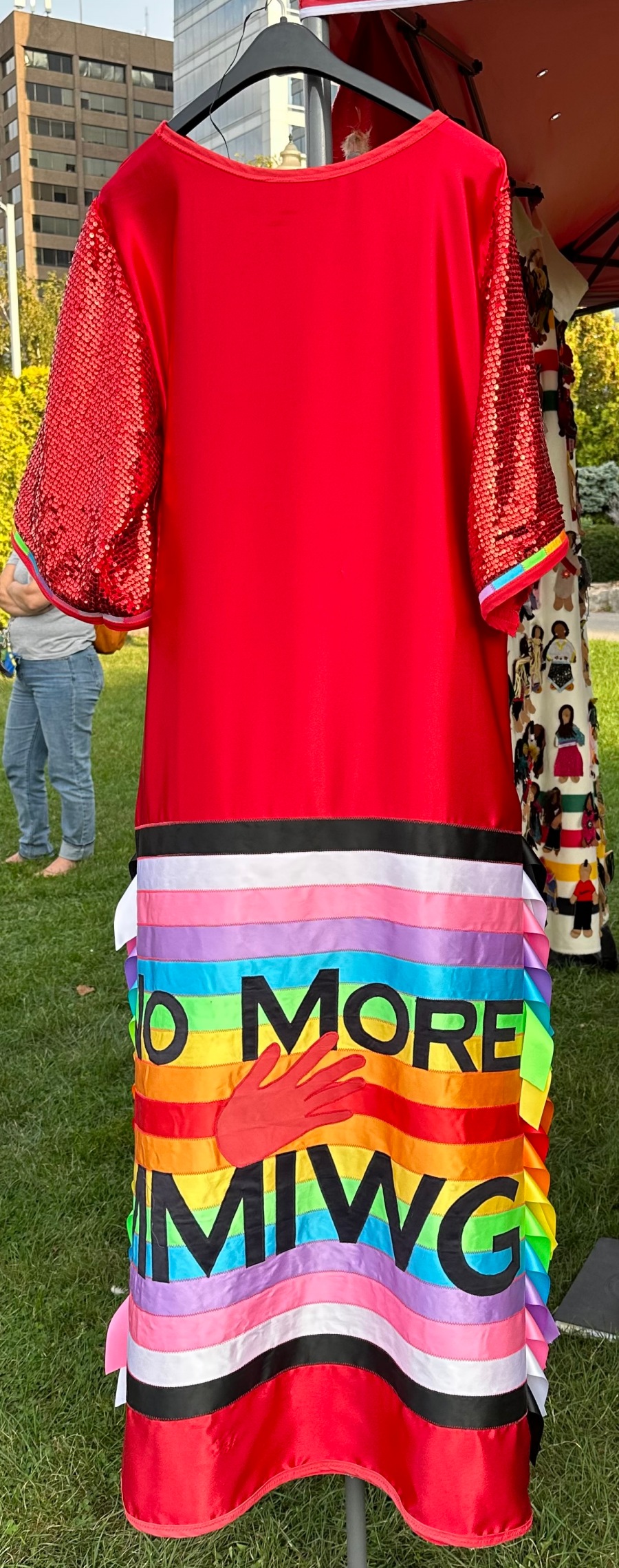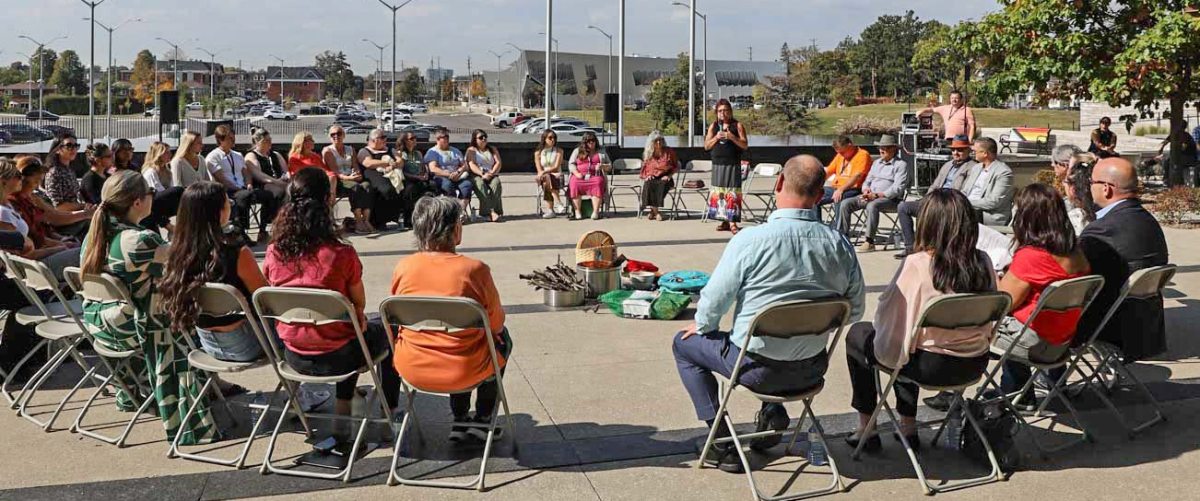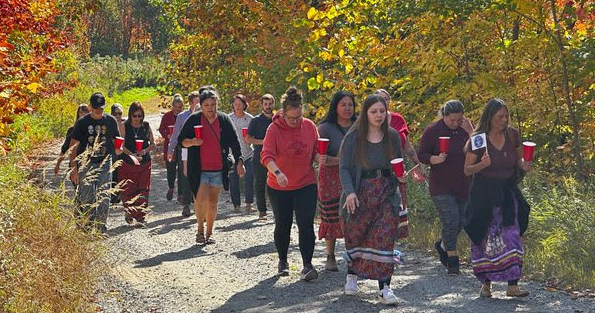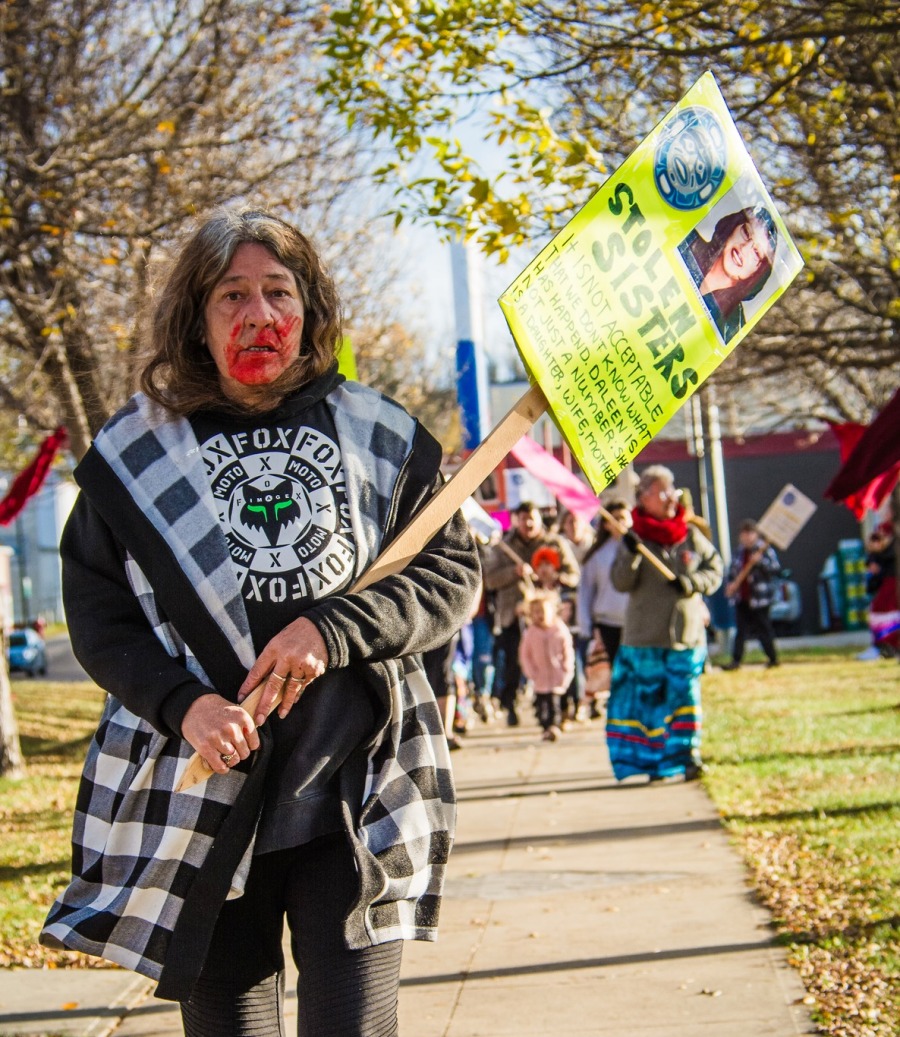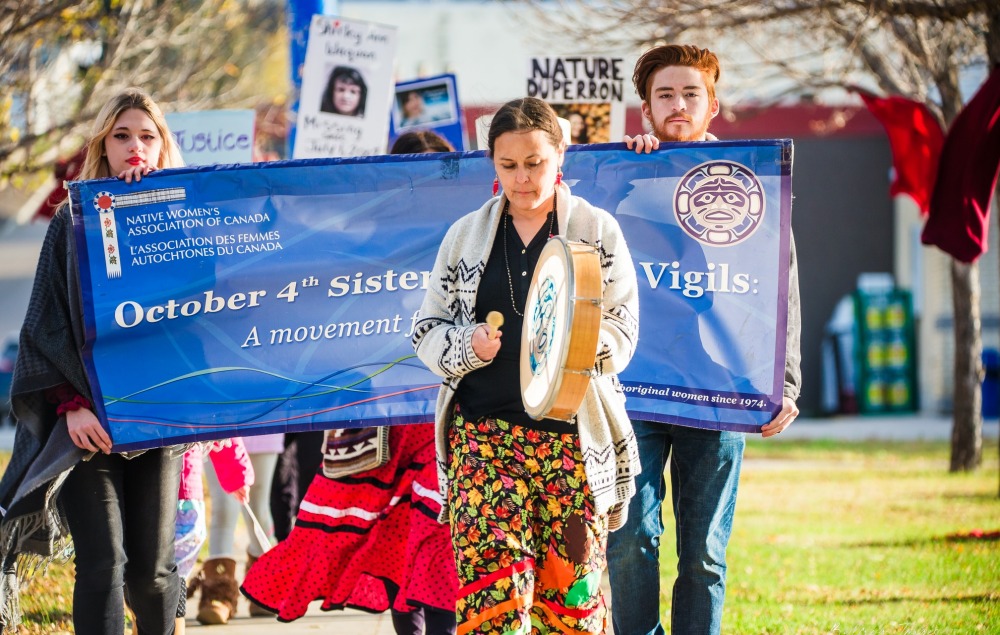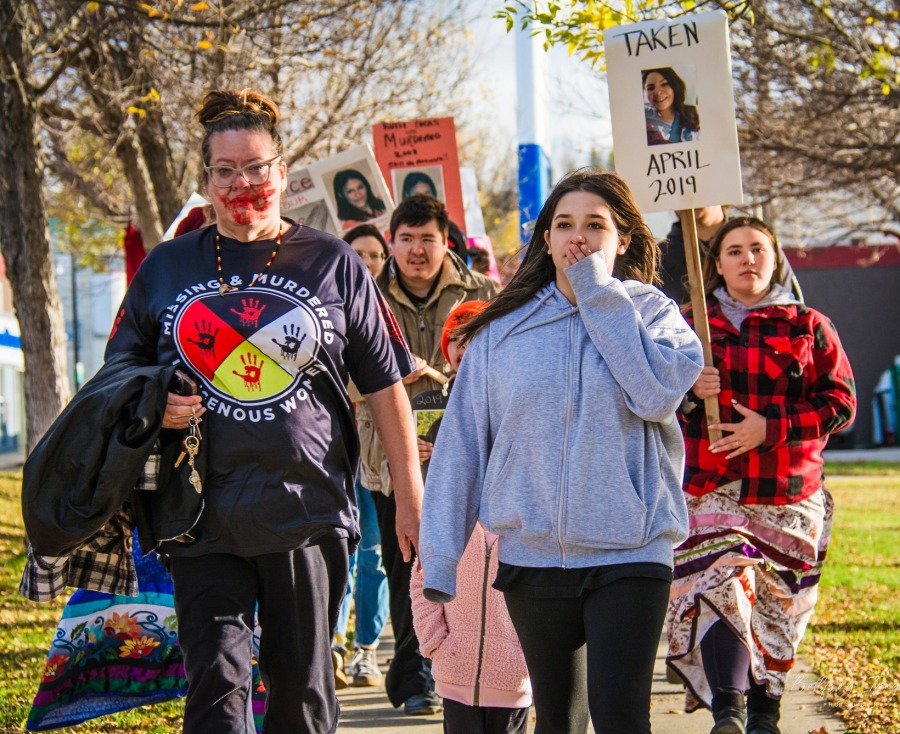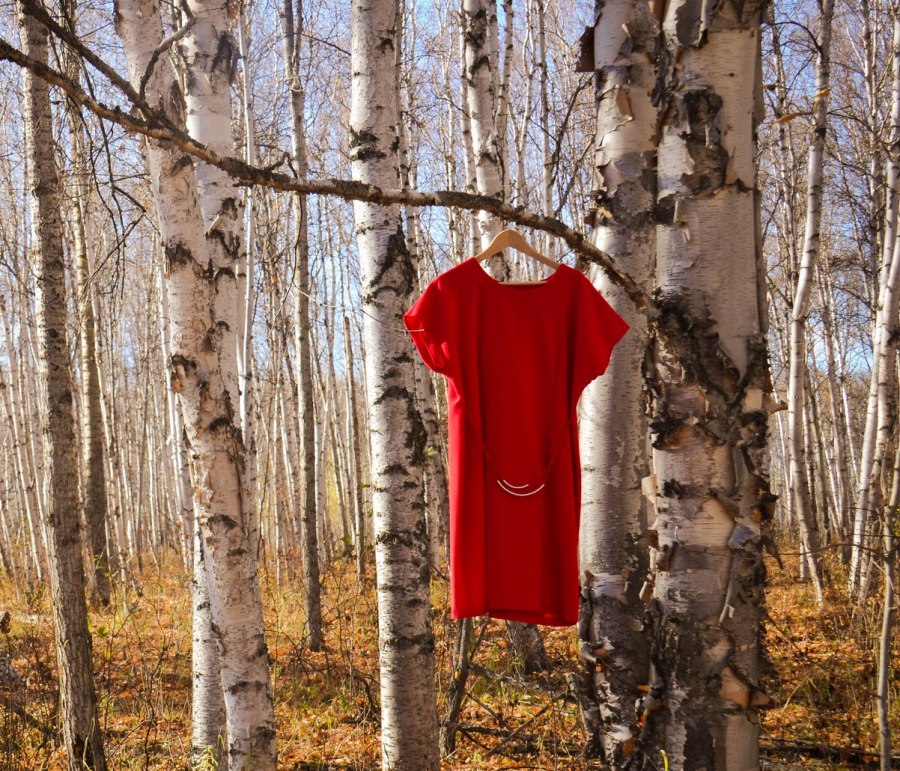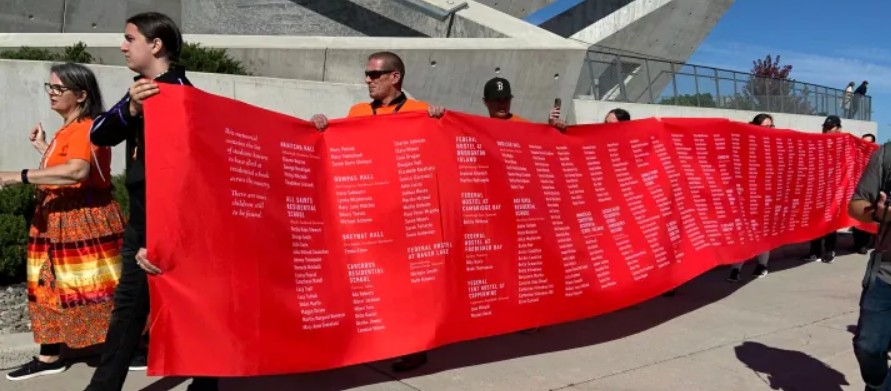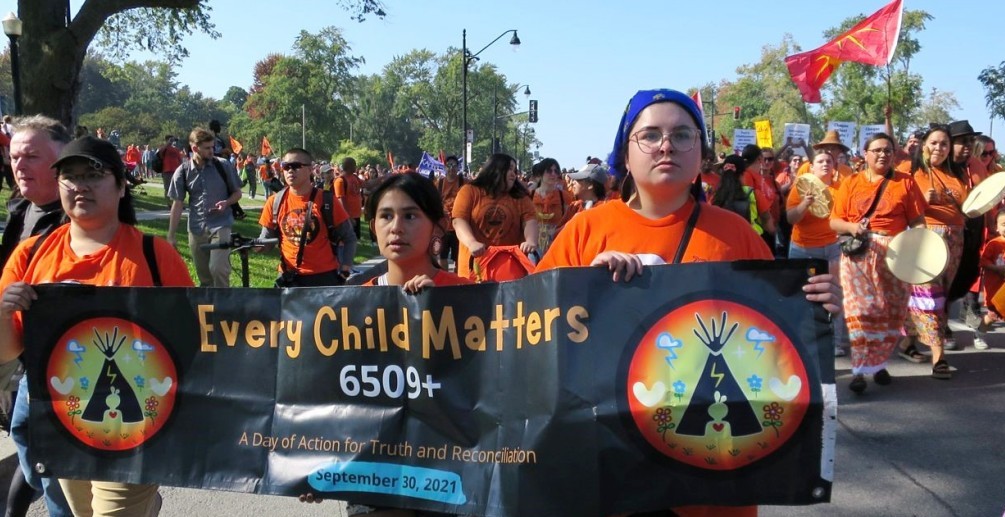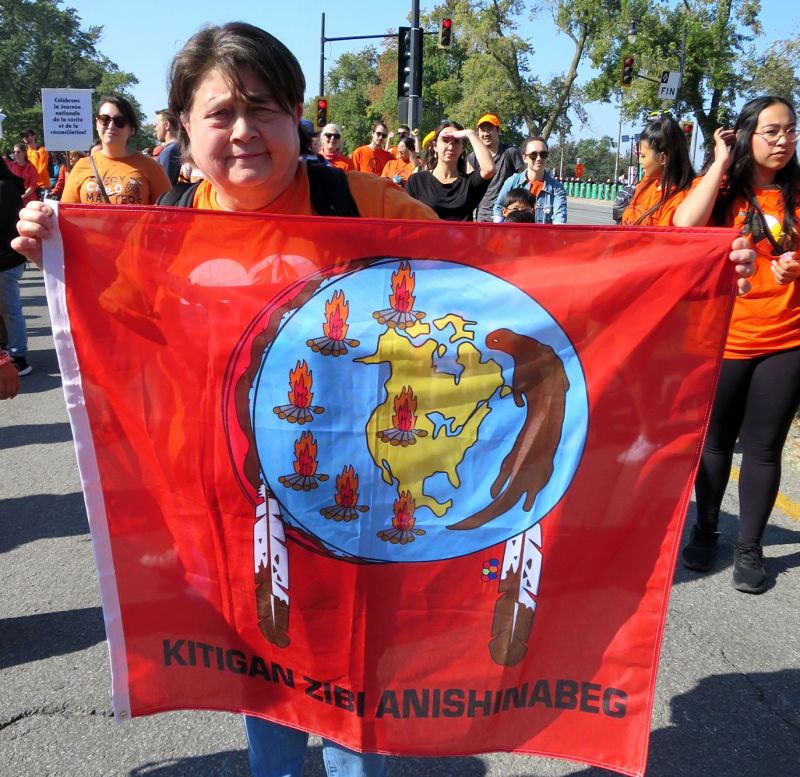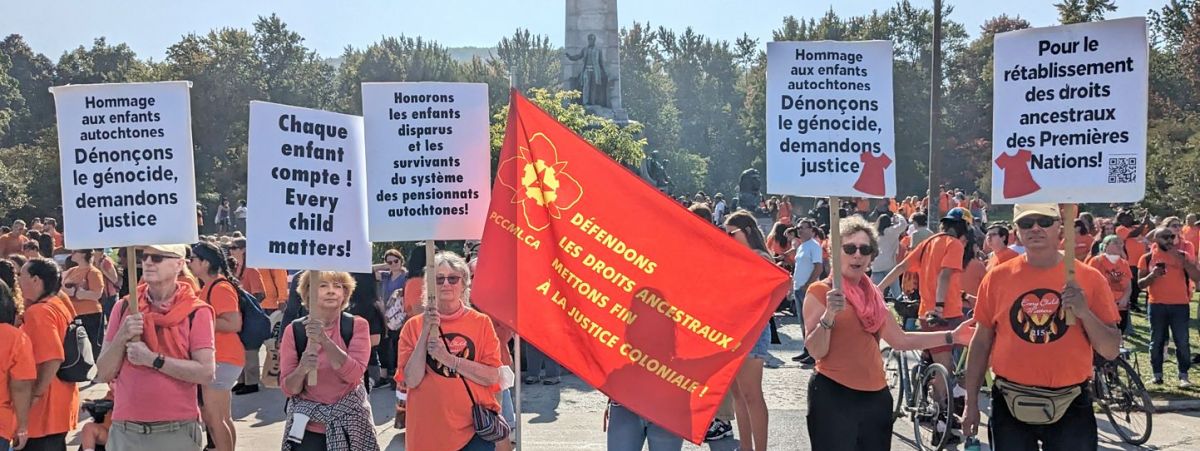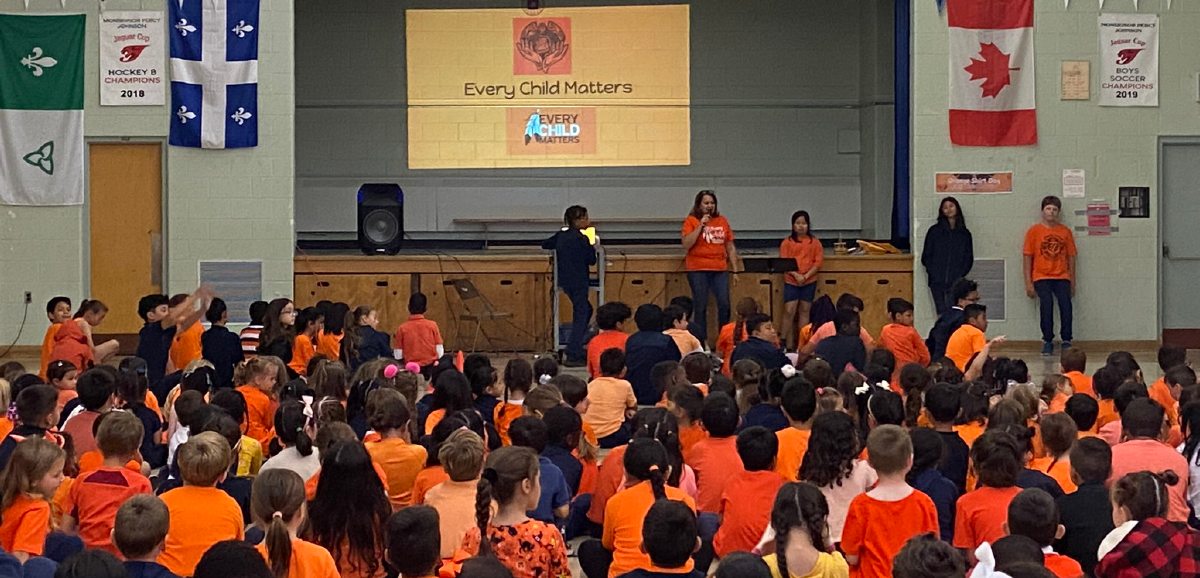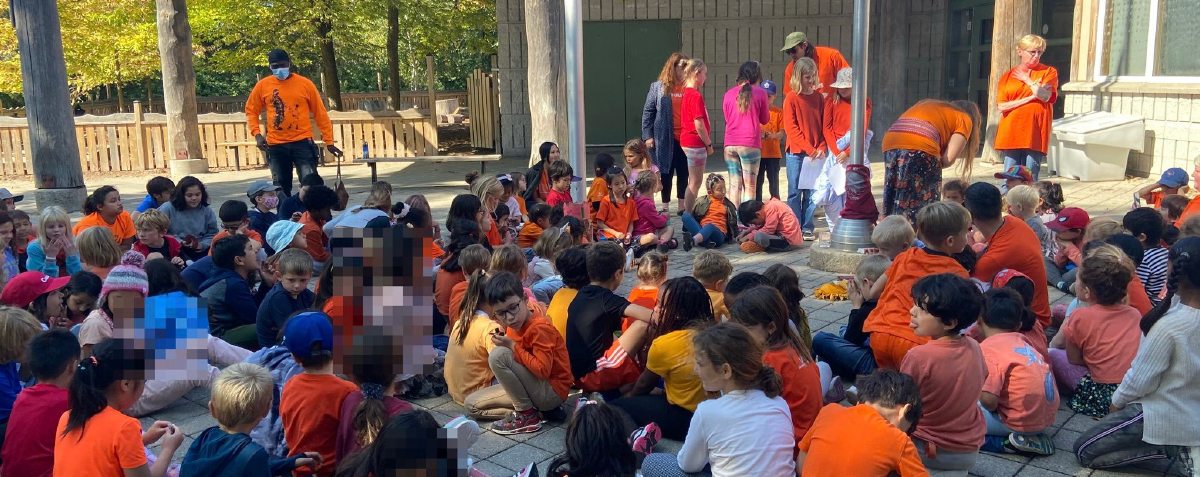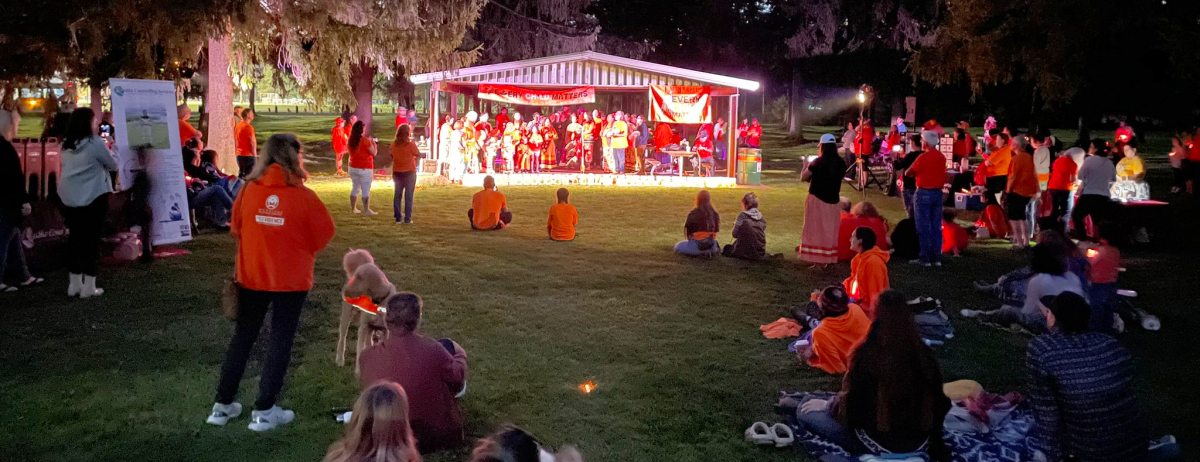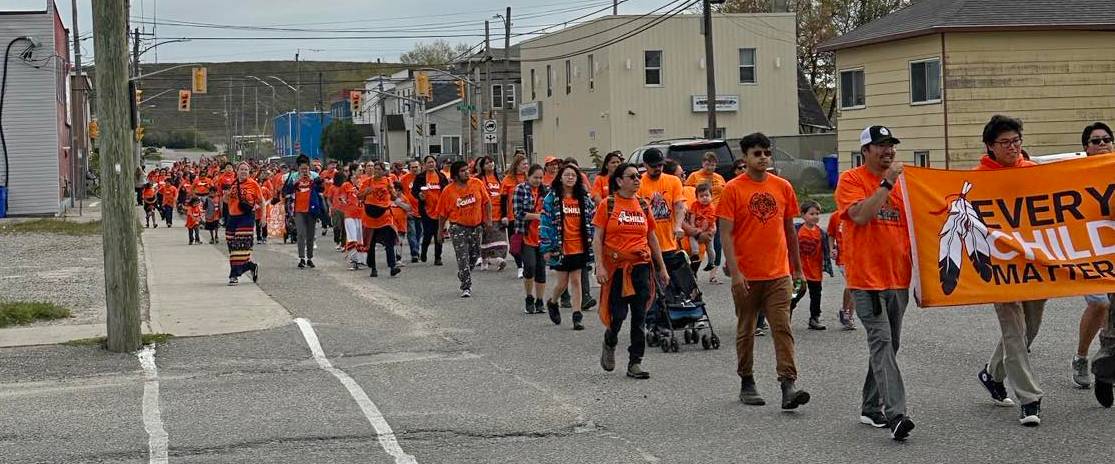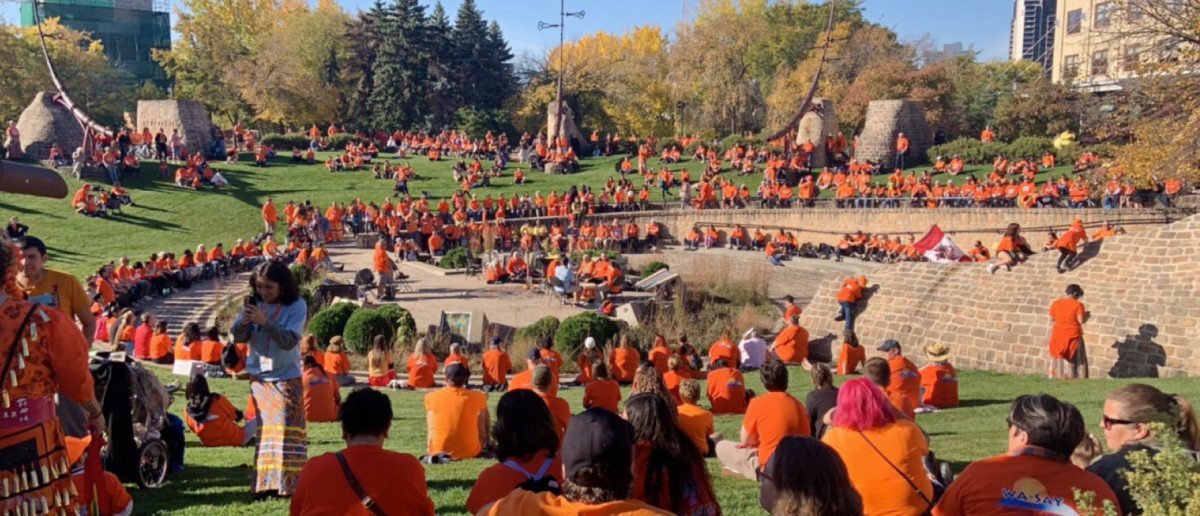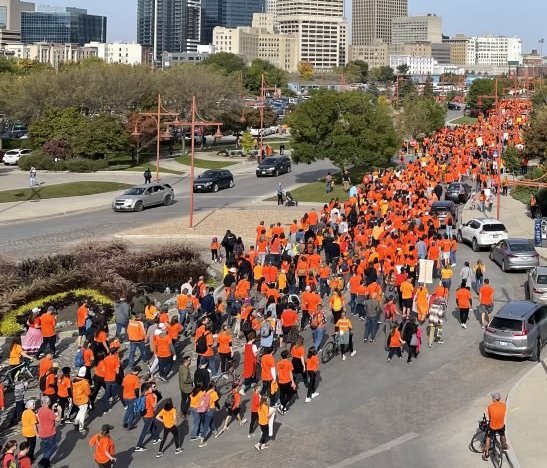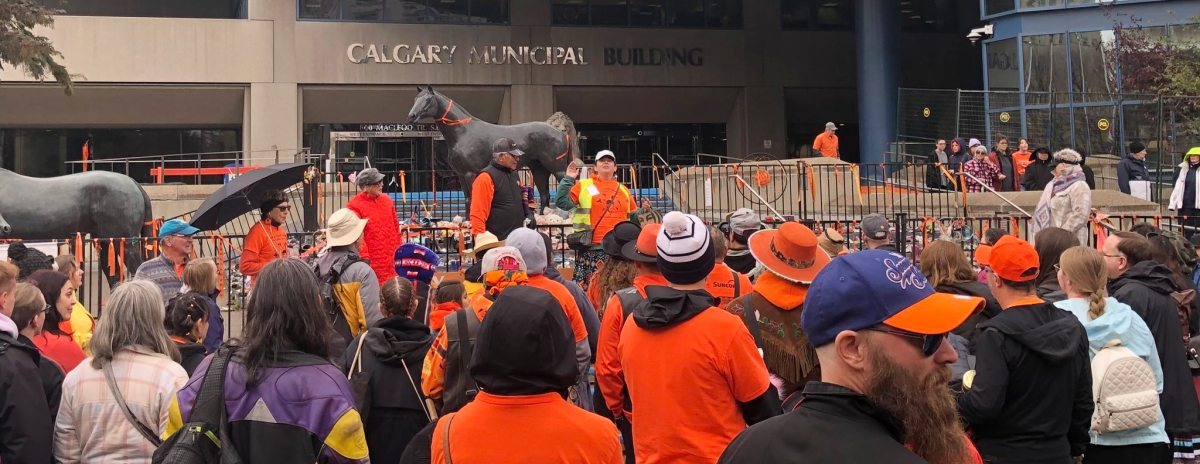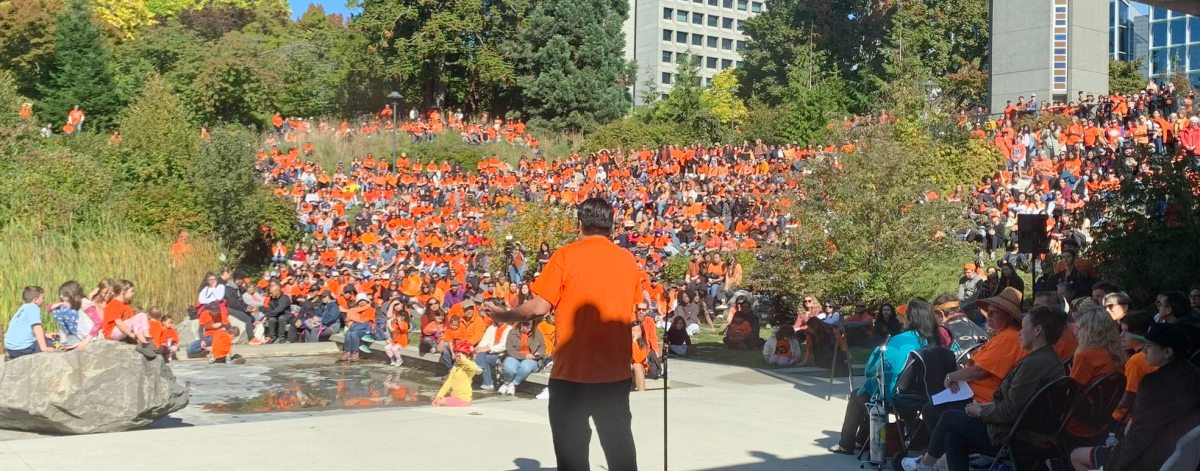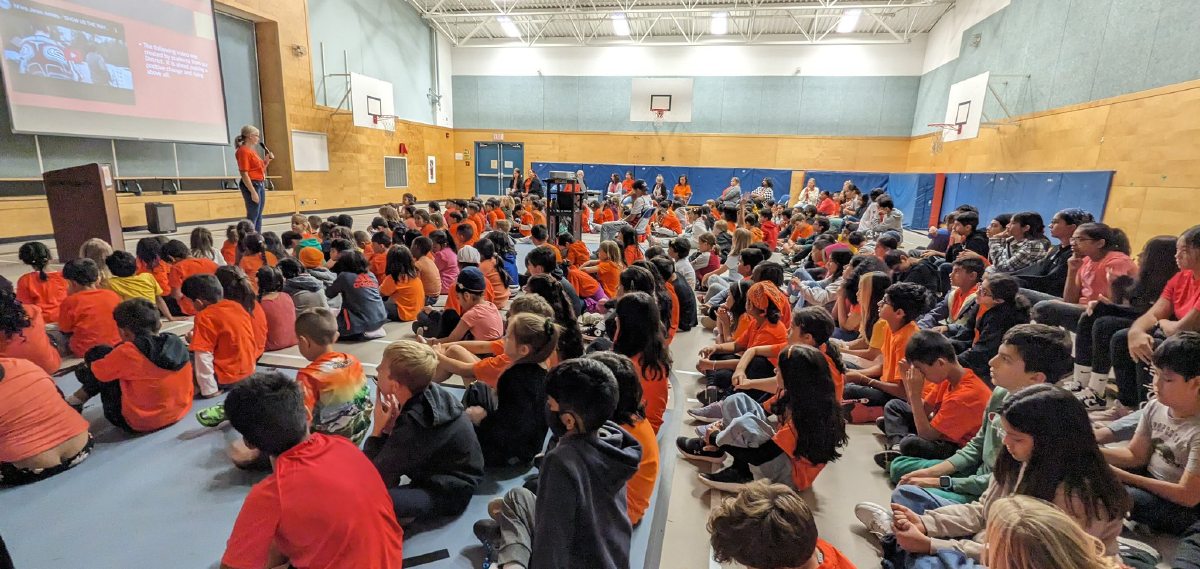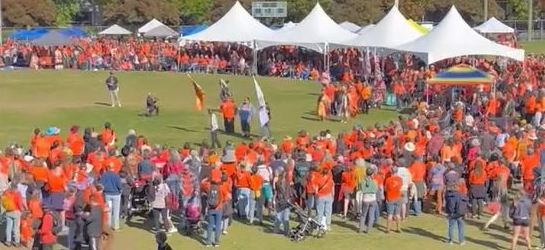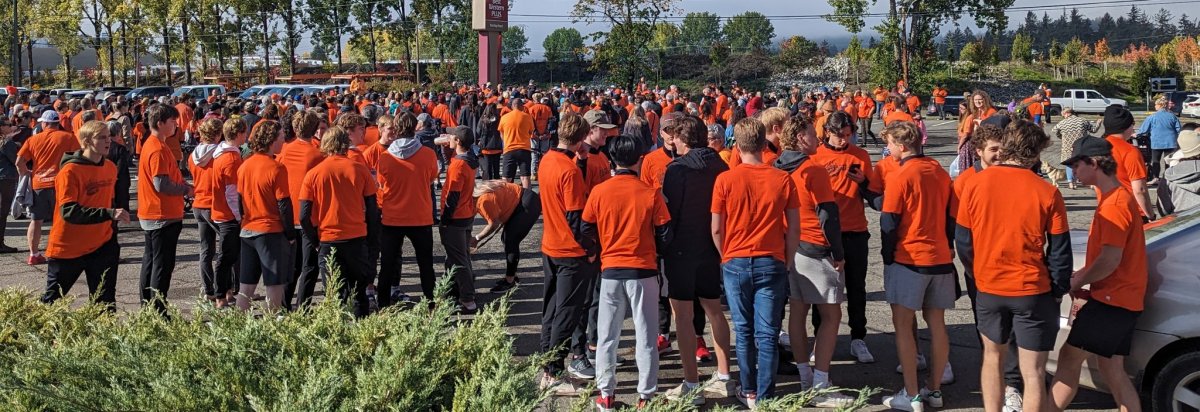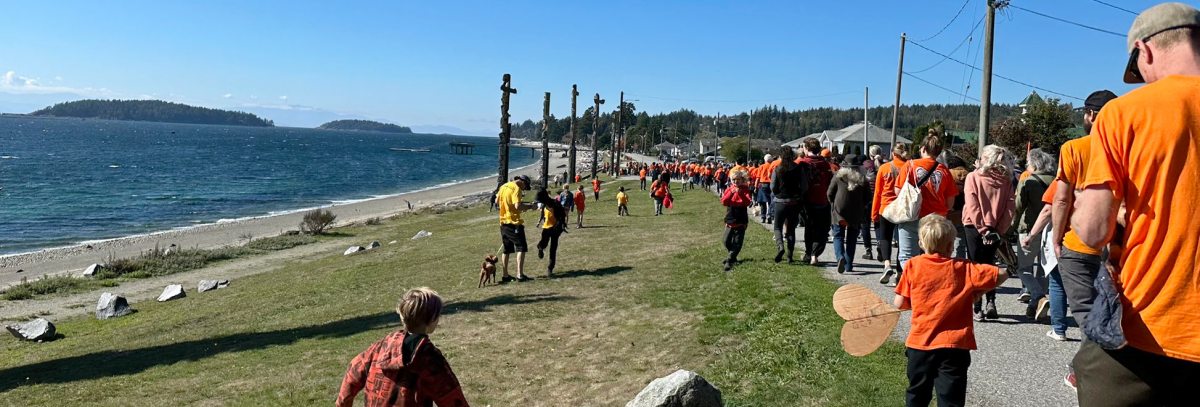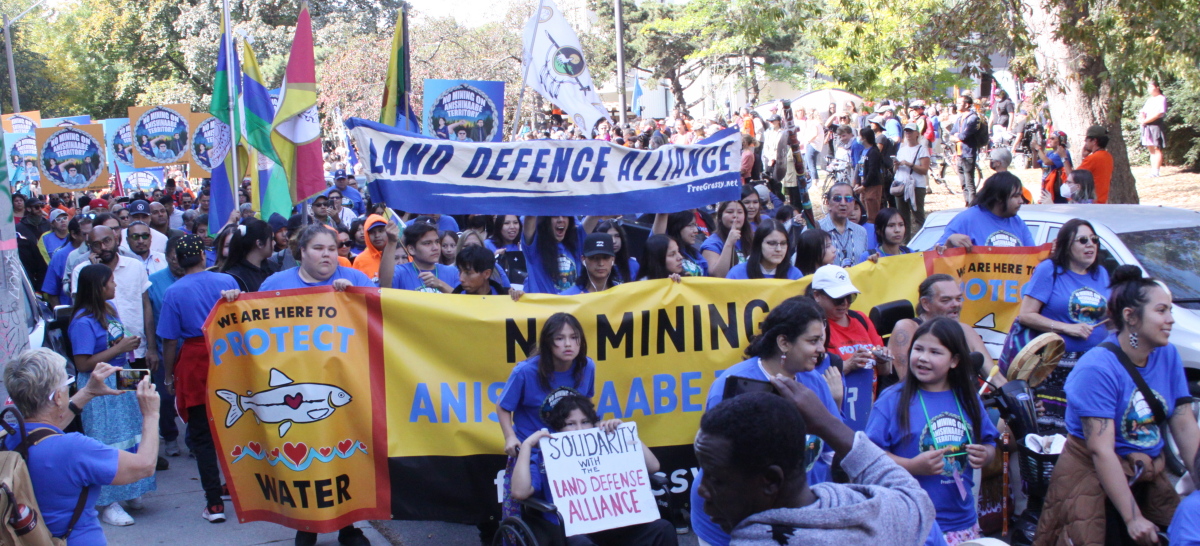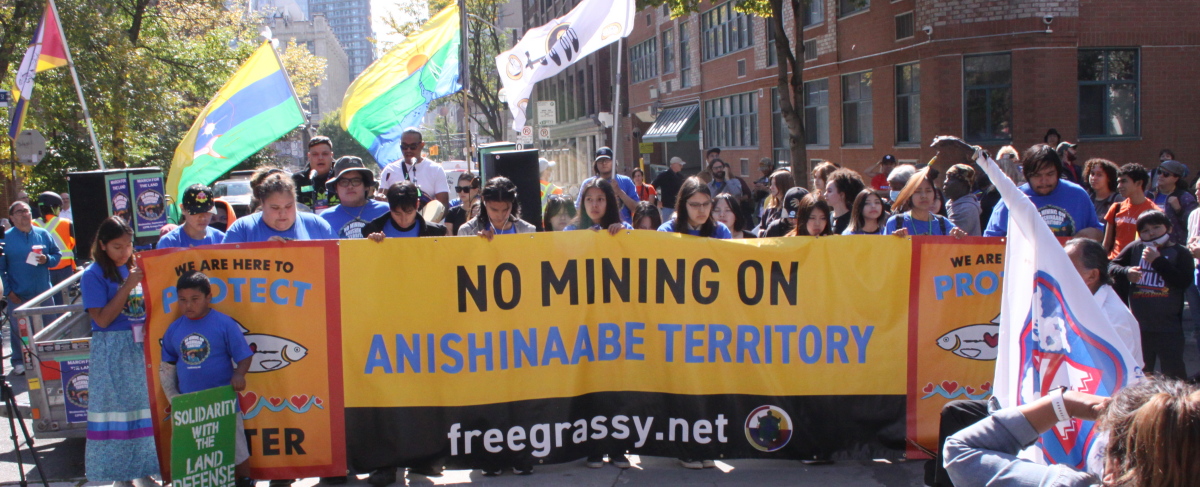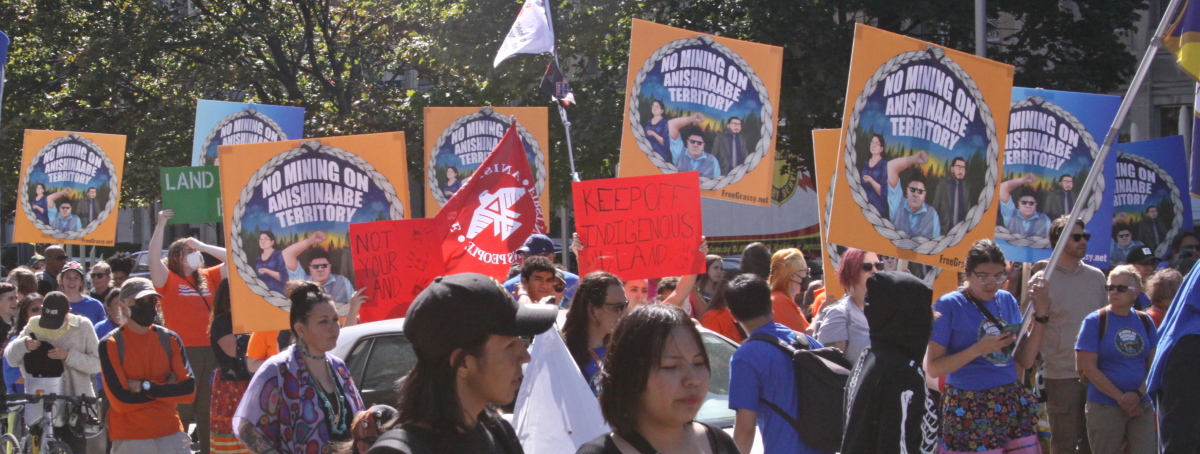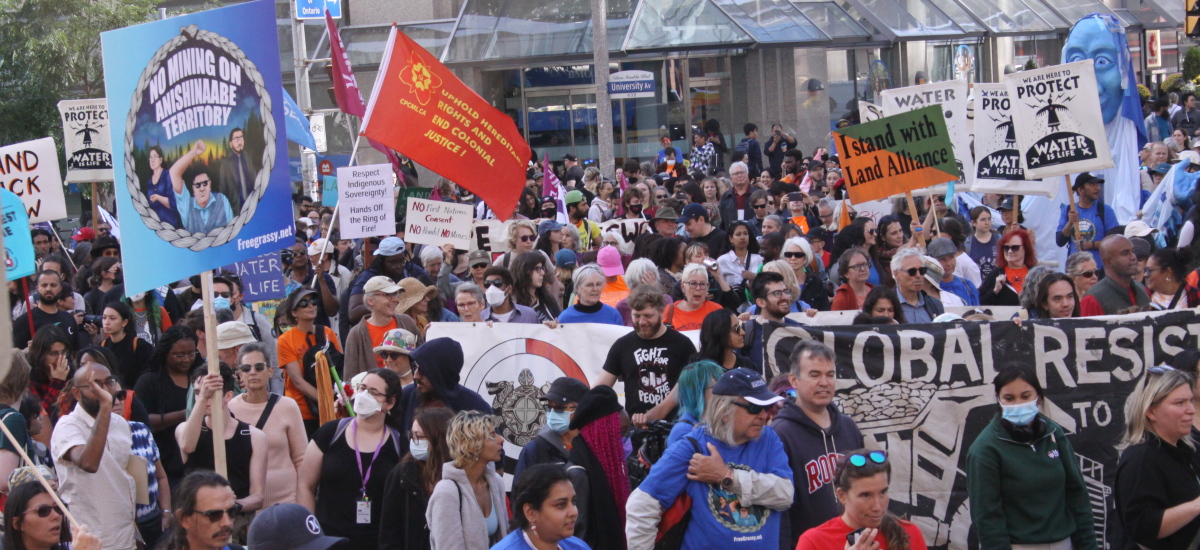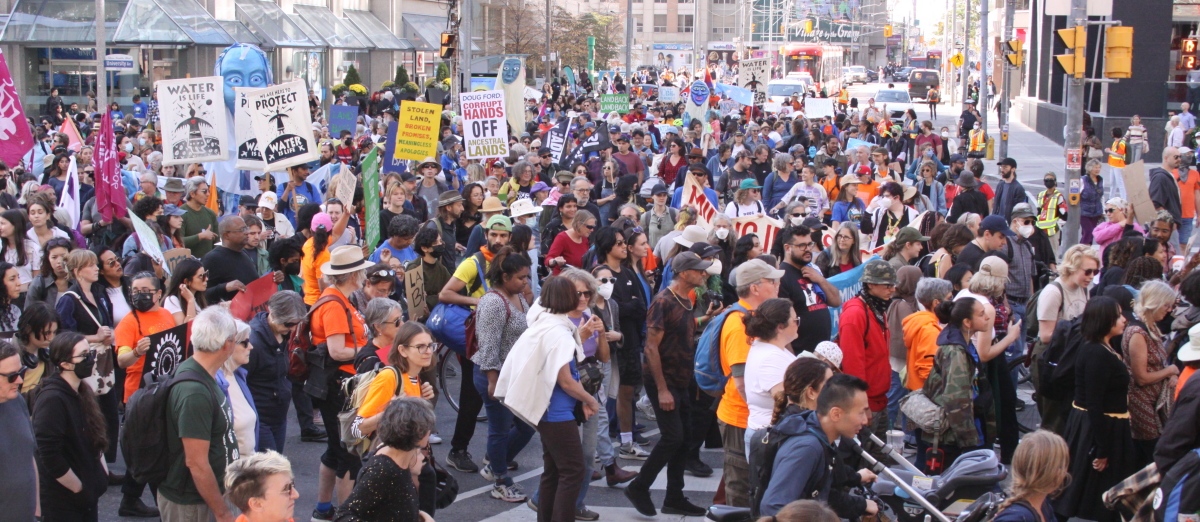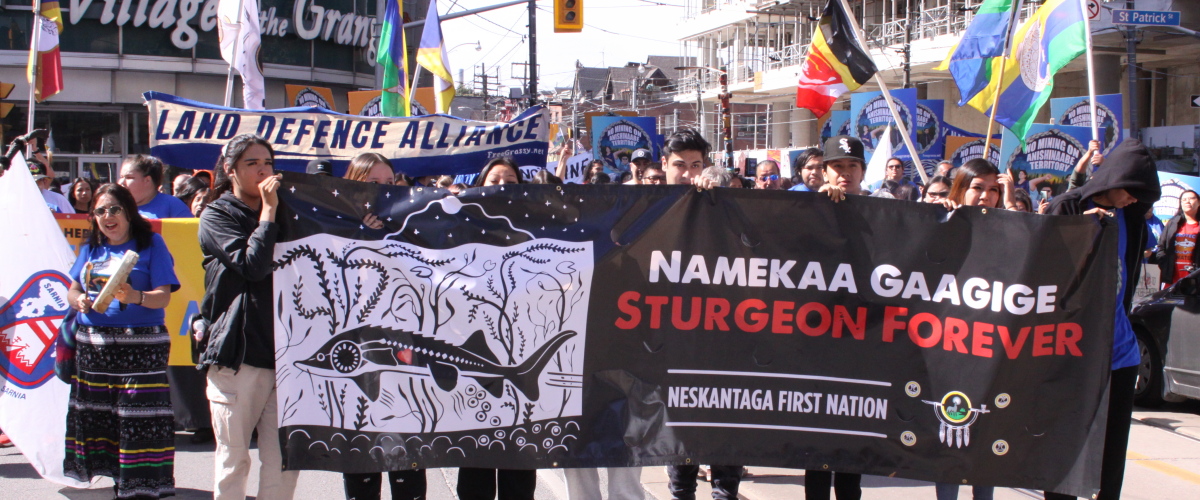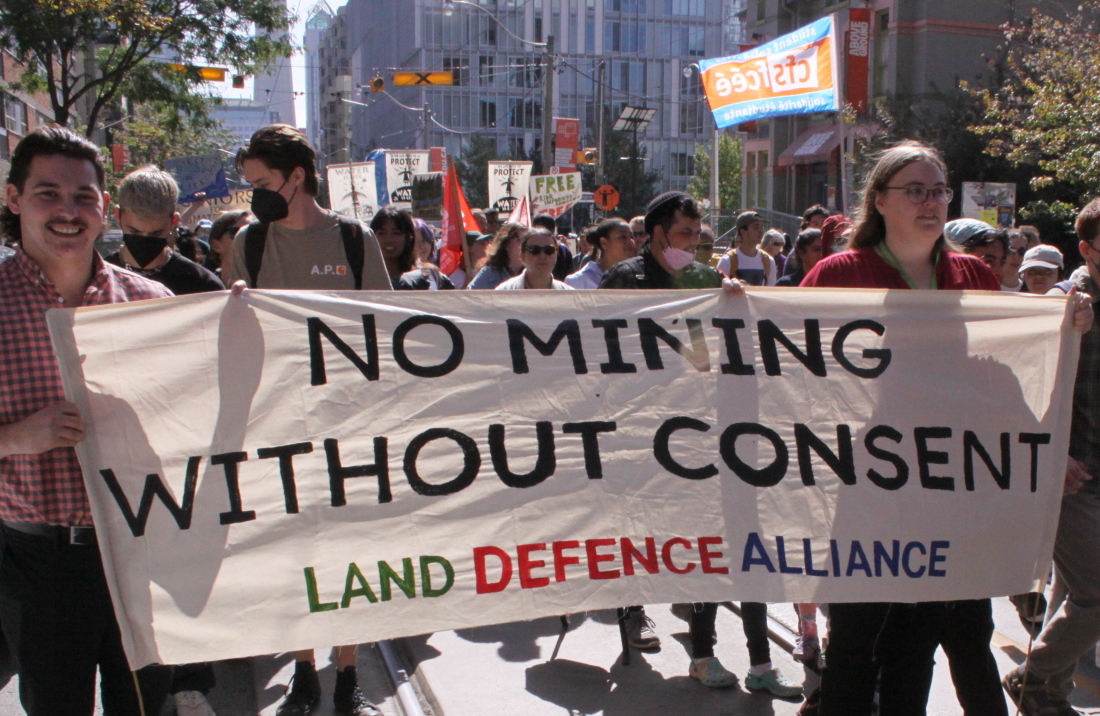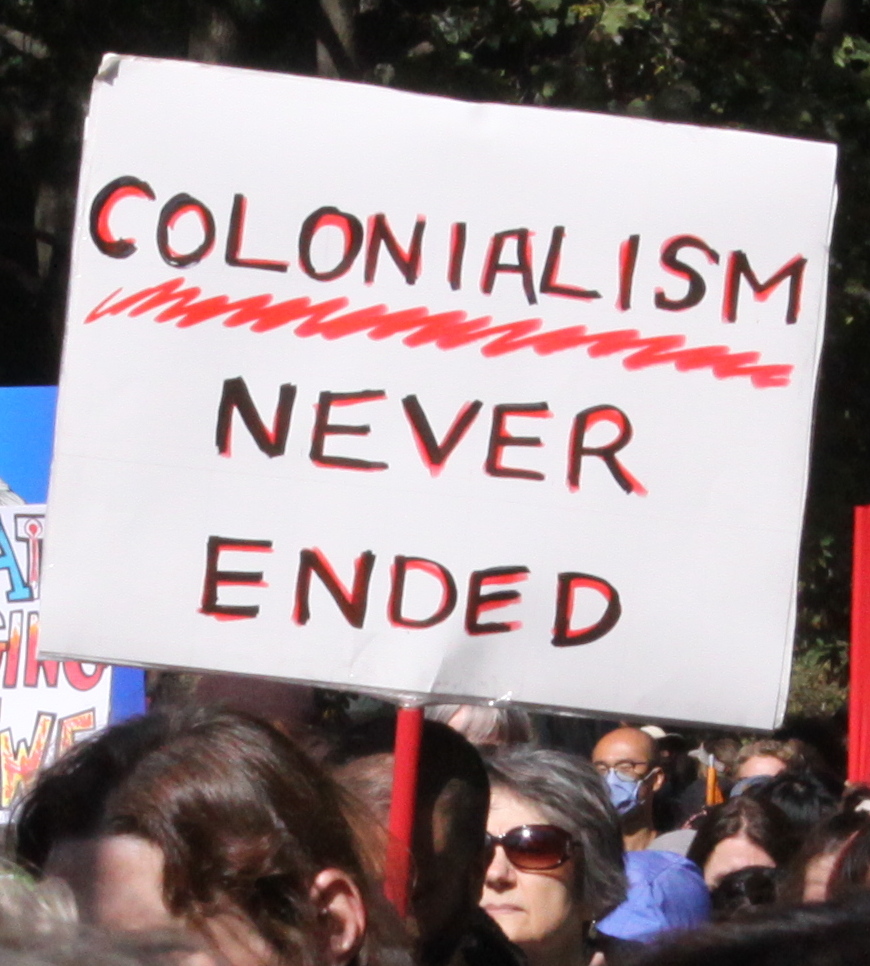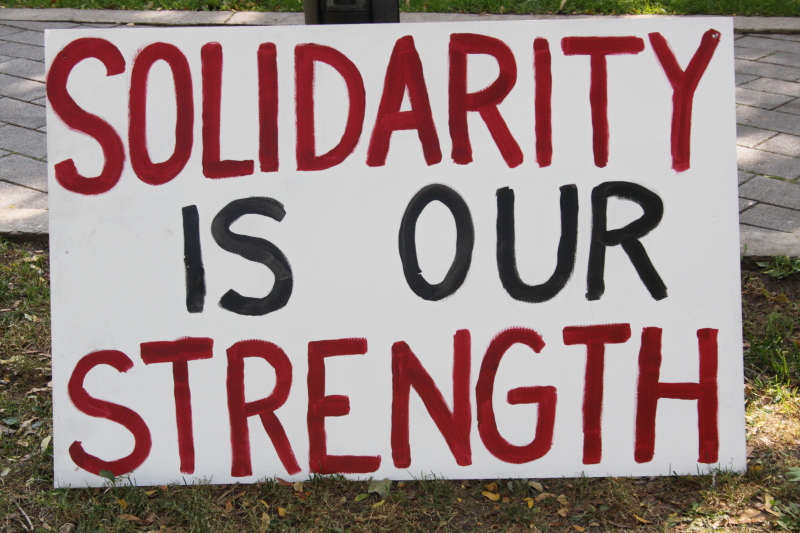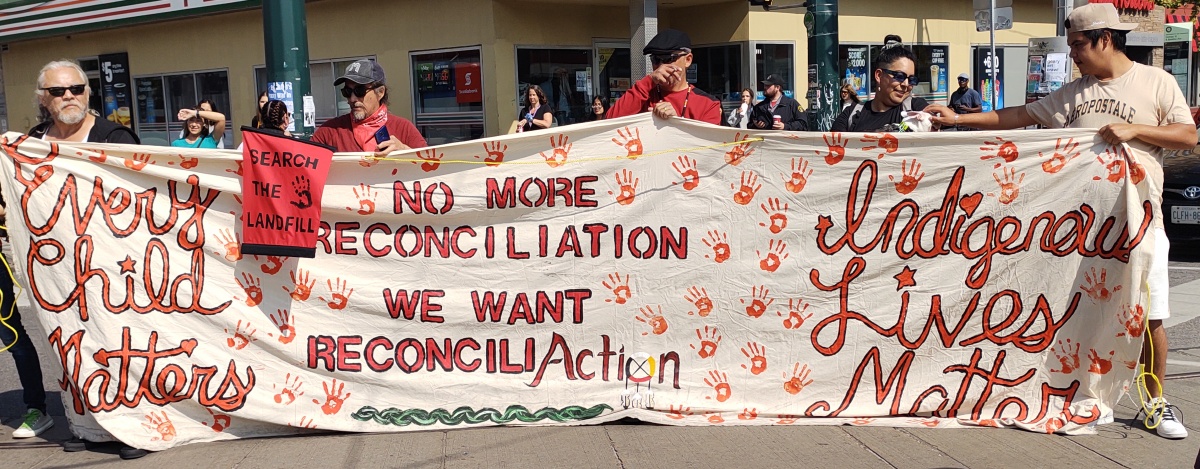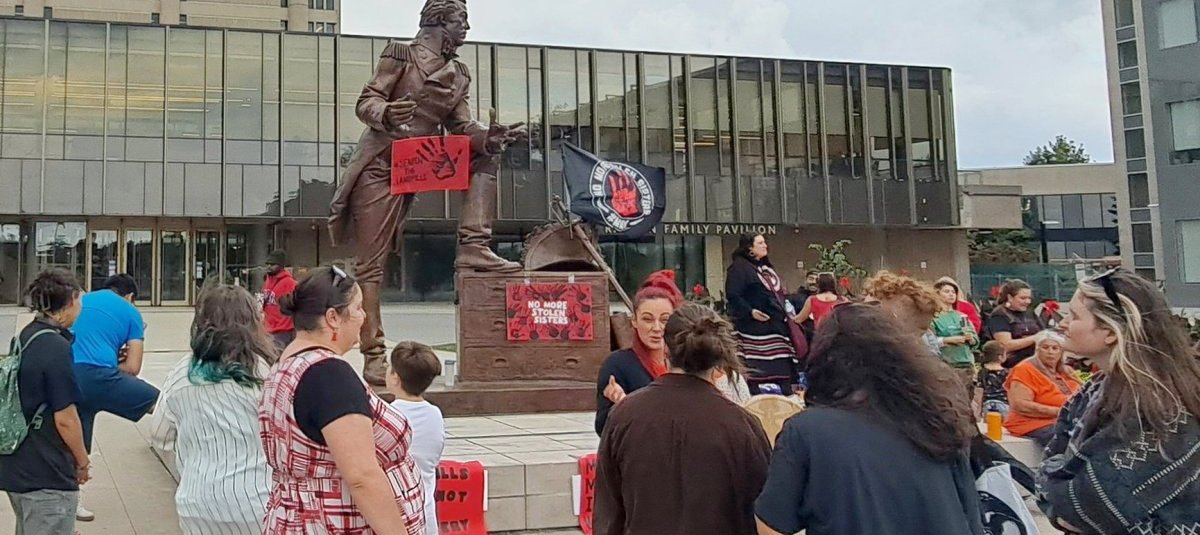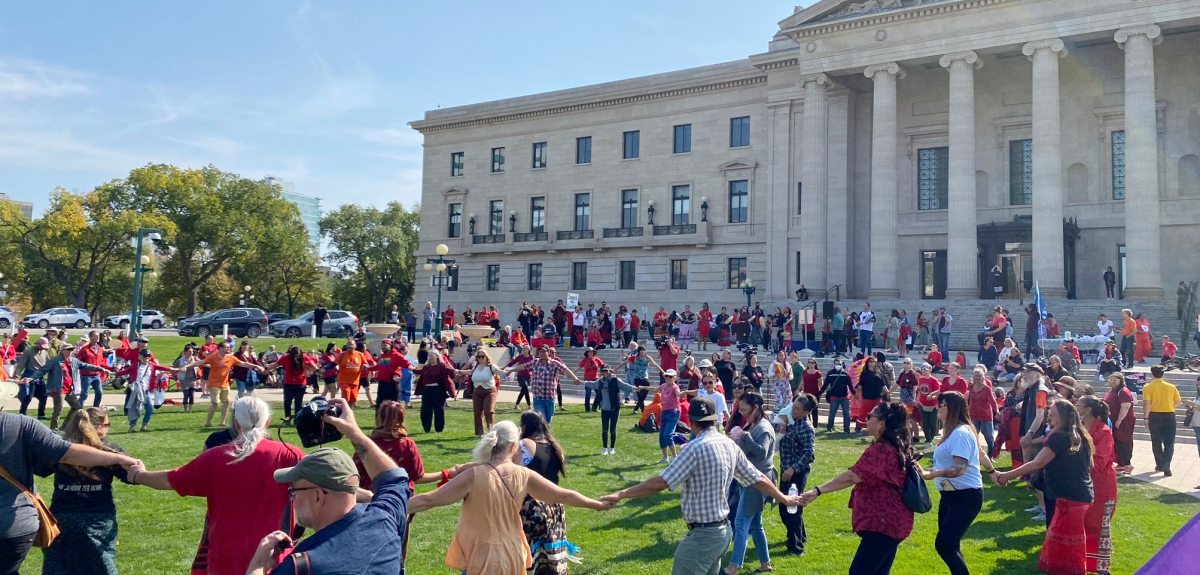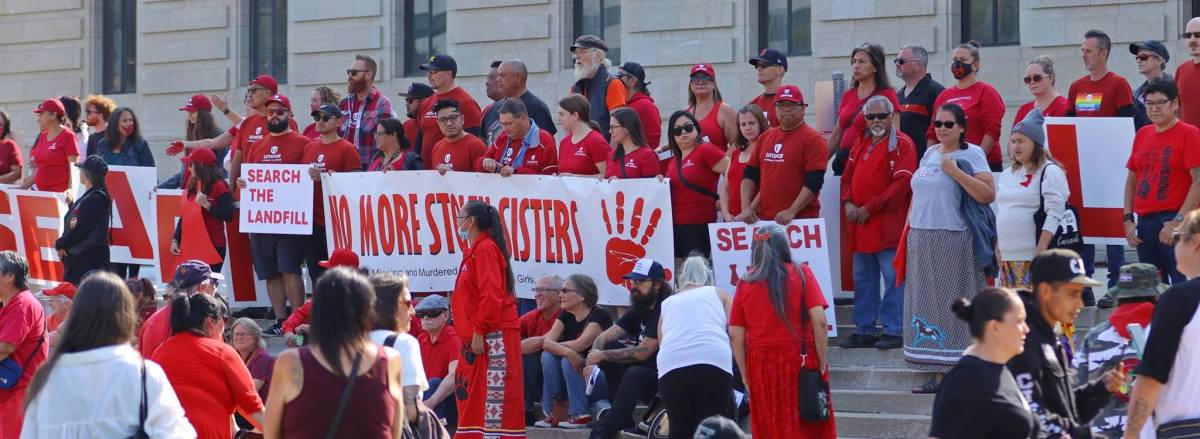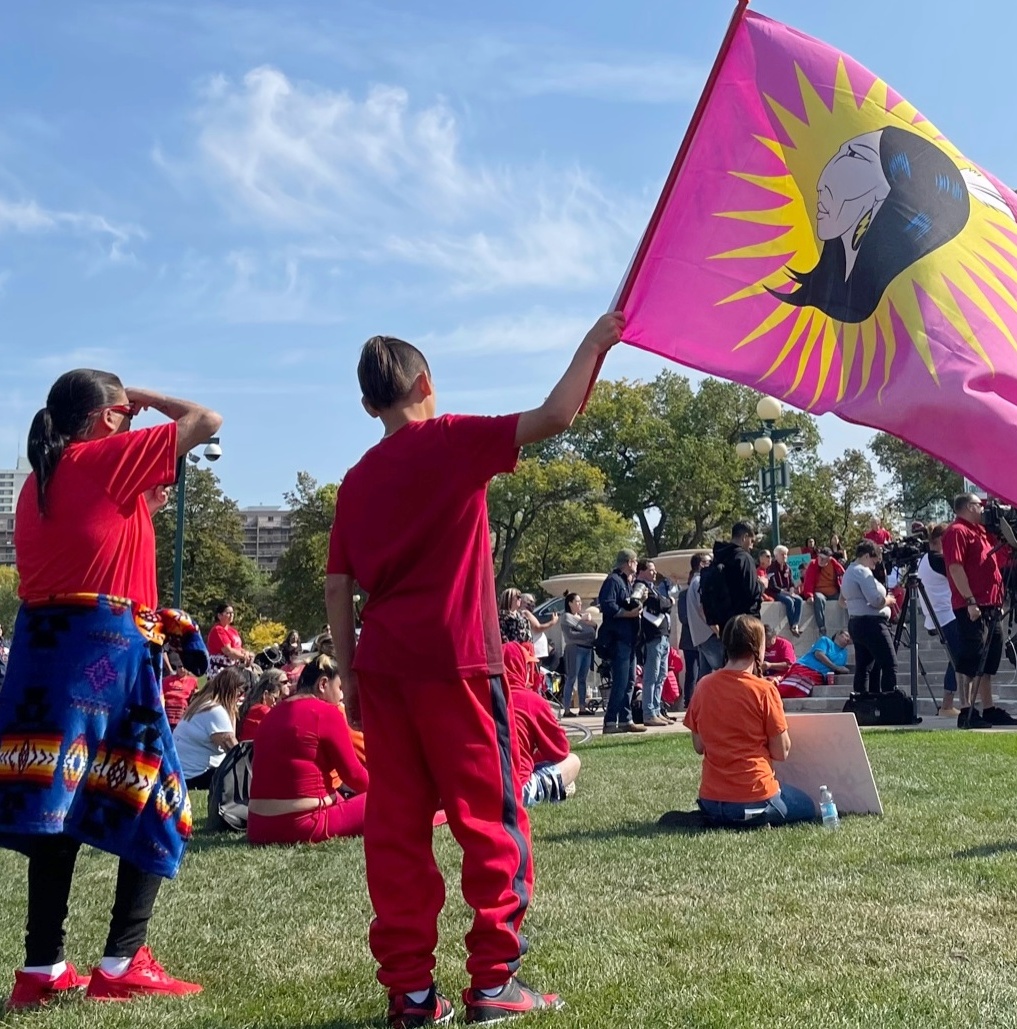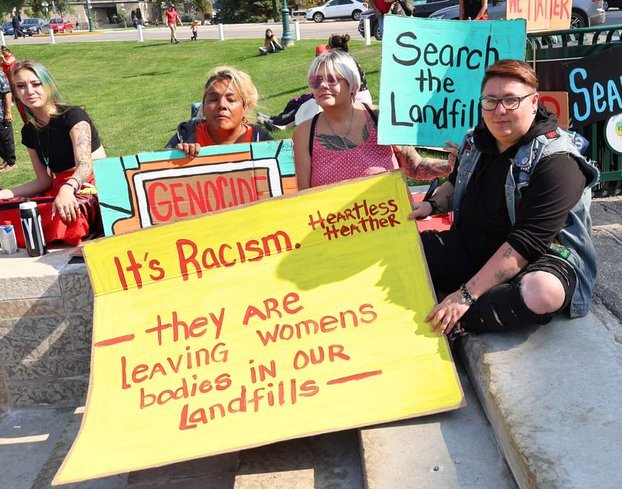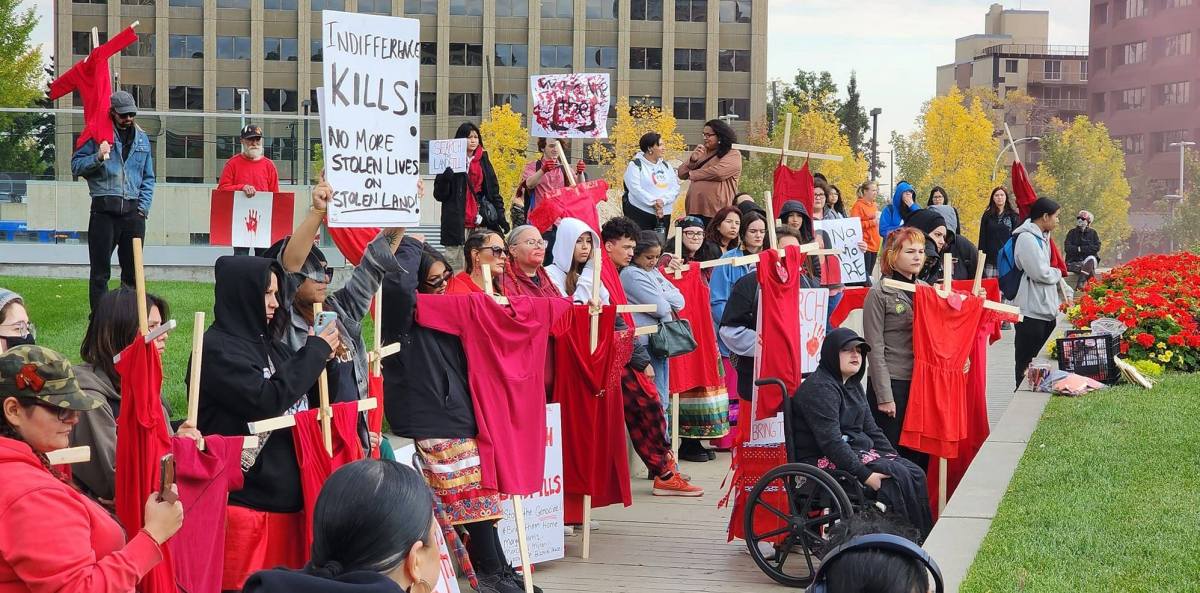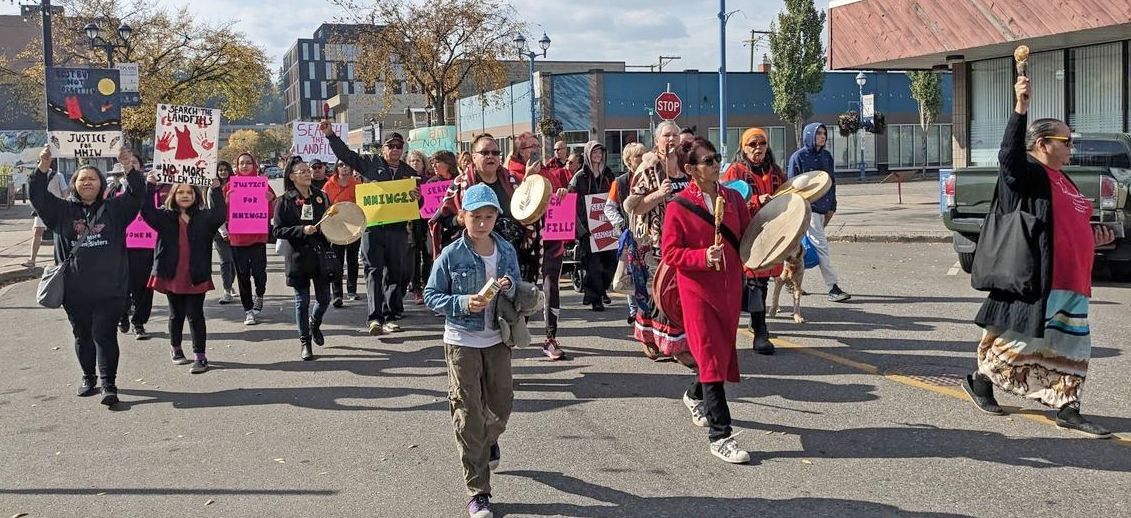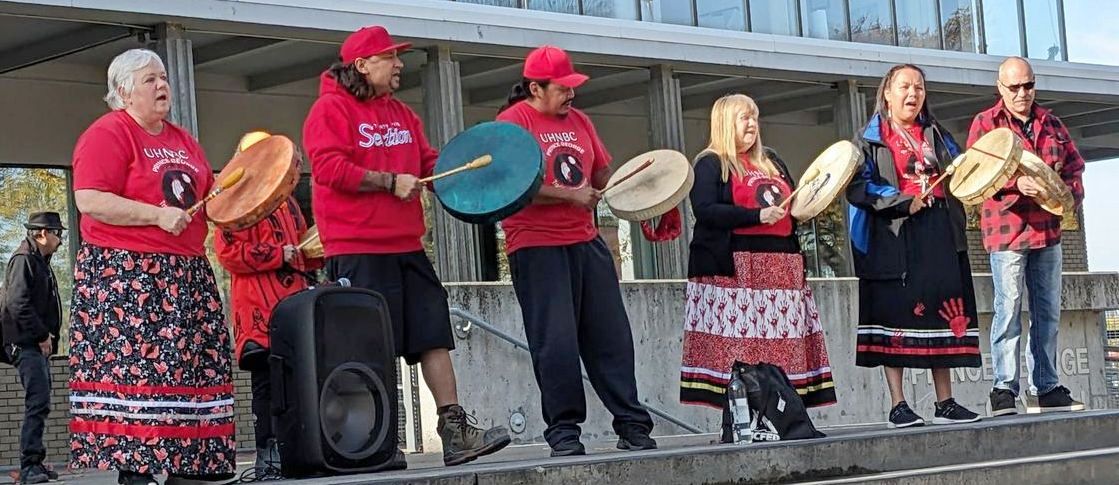No. 9
October 2023
Sisters in Spirit Vigils
• Honouring the
Indigenous Women and Girls
Who Have
Gone Missing and Those Murdered
National Day for Truth and Reconciliation -- Orange Shirt Day
• Tens of
Thousands Mark Third Annual
National Day
for Truth and Reconciliation
Third Anniversary Vigil
• Remembering and Honouring Joyce Echaquan
End Illegal Mining and Resource Extraction in Northern Ontario!
• Thousands Rally at Queen's Park to Demand Ford Government Respect Indigenous Peoples' Jurisdiction
"Search the Landfills" Nationwide Day of Action
• Actions
Across Country Demand Justice
and Dignity for
Murdered Indigenous Women
• Rally on Parliament Hill as Fall Session Begins
Sisters in Spirit Vigils
Honouring the Indigenous Women and Girls Who Have Gone Missing and Those Murdered

Calgary, October 4, 2023
On October 4, vigils and other events were held in Quebec and across Canada to honour the memory of the thousands of missing and murdered Indigenous women and girls. The vigils have been held since 2006, organized by the Native Women's Association of Canada along with local organizations.
|
This year vigils were held in the National Capital Region, Montreal, Thunder Bay, North Bay, Nipissing, Kingston, Oshawa, Toronto, St. Catharines, Windsor, Regina, La Ronge, Calgary, Fort McMurray, Lethridge, Oliver, Squamish, Vancouver and Dawson City as well as other locations.
The vigils support grieving families and provide opportunities for healing; and aim to be a movement for social change, united in the demand for action on an issue that affects us all, the Native Women's Association of Canada states in organizing material for the events.
The numbers of those missing and murdered is a damning indictment of the government's refusal to act. The disappearances and deaths continue at an alarming rate while the state refuses to investigate these cases and bring those responsible to justice, not infrequently dismissing suspicious deaths as suicides or accidents, and missing women as having run away and "not wanting to be found." This is to say nothing of the fact that in not a few cases the police, and other state agents, themselves are implicated in racist violence against Indigenous women and girls which they carry out with impunity. Little has been done either to implement the 231 calls for justice put forward in the final report of the National Inquiry into Missing and Murdered Indigenous Women and Girls.
The stalling of the federal government on the demand -- which has gained broad support across the country -- to search the landfills for the remains of at least three murdered Winnipeg Indigenous women this year is front of mind and is still more evidence that for all the governments' expressions of concern, Indigenous women and girls are considered as disposable.
Charlottetown
Montreal
Toronto
Windsor
Vaughan
Nipissing
Athabasca
Lethbridge



Calgary
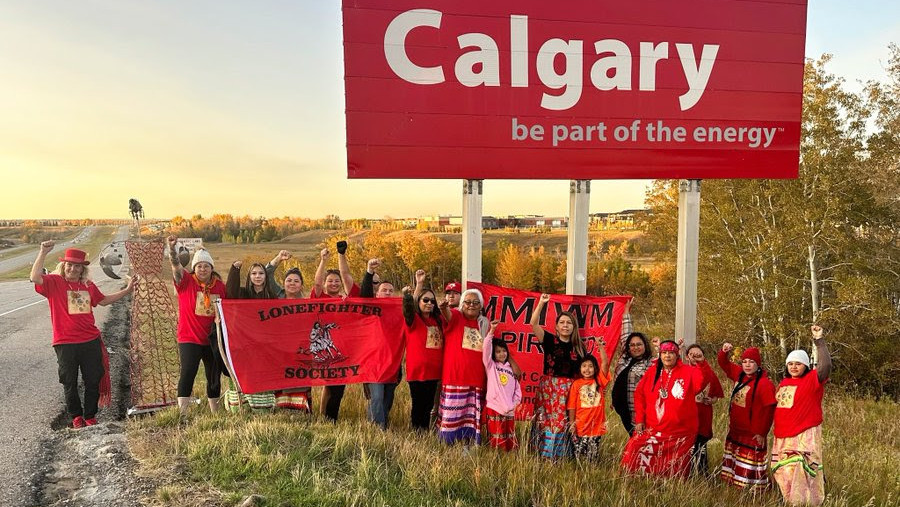

(Photos: TML, A. Woo, My Sea to Sky, Iskwea, C. Ainsworth, Anishinabek Nation, Bullfrong, Austin Photo, L. Beebe)
National Day for Truth and Reconciliation
Tens of Thousands Mark the Third Annual National Day for Truth and Reconciliation
Indigenous Peoples, Canadians and Quebeckers held rallies, marches, cultural events and vigils on September 30 to mark the third annual National Truth and Reconciliation Day across the country. Programs were held in many schools. The day honoured the victims and survivors of the Indian Residential School System, into which more than 150,000 First Nations, Métis and Inuit children were abducted by the Canadian colonial state. These children were sent to Church-run schools far away from their families in an effort to destroy the cultures of Indigenous Peoples, and extinguish them as peoples in a brutal colonizing project. National Truth and Reconciliation Day also honoured the victims of the Sixties Scoop in which Indigenous children were taken away from their families by child welfare agencies and placed for adoption or put in institutions.
National Truth and Reconciliation Day 2023 was an expression of the unity between the Indigenous Peoples, Canadians and Quebeckers to not only recognize the wrongdoing of the Canadian state in the past, but to end the ongoing state violence against Indigenous Peoples today. It was also an expression of political unity to work together to ensure justice for the more than 6,000 children who died in residential schools, according to the 2015 Truth and Reconciliation Commission's (TRC) Report. At the same time it reflects the determination to ensure that the survivors of the Residential School System and their families are properly compensated and supported to make up for this horrific holocaust by holding the Canadian governments and state institutions to account.
Despite the pious proclamations by Prime Minister Trudeau for the occasion that the "Government of Canada will be there every step of the way to provide them [the survivors of Residential Schools] with the resources they need to fully uncover the truth of what happened at residential schools, honour the children who did not return, and support communities as they continue on their healing journeys," the reality is that very little action has been taken by the Trudeau Liberal government to realize the TRC's 94 Calls to Action.
In fact the Trudeau Liberals have continued the racist colonial violence against Indigenous Peoples such as in the case of the state-organized paramilitary attacks against the Wet'suwet'en land defenders affirming their hereditary rights to their territory, the ongoing refusal to take action to stop the genocide against Indigenous women, girls and two-spirited people and the underfunding of social programs for Indigenous communities.
As the September 29 statement of the Native Women's Association of Canada noted, "We had great hope, when the TRC released its final report, that the process of reconciliation would begin in earnest. The Prime Minister promised to meet all 94 Calls to Action. But, here we are, eight years later, and only a handful of those Calls have been fulfilled. The work to enact them appears to have stalled. And some of the simplest have been left untouched." The organization has called for the government and politicians to act now to implement all 94 calls.
National Truth and Reconciliation Day this year is an expression of the determination of the Indigenous Peoples united with the people of Canada and Quebec to step up the fight for the rights of Indigenous Peoples so that Canada's racist colonial history and legacy can be ended.
Parliament Hill in Ottawa
The third National Day for Truth and Reconciliation was commemorated September 30 on Parliament Hill. The orange t-shirts, which have become the emblem of the children who died or disappeared in the residential schools, were prevalent on the Hill and on the streets of Ottawa.
 Many of the
speakers pointed out that the National Day of Truth and
Reconciliation
was the deed of the survivors themselves. Elder Doreen Bernard
said:
"We honour the missing children who never came home and the
children
who have been found and those we are still searching for. We
honour the
courage of survivors who led the fight for justice, to speak our
truth,
to tell Canada and the world we survived genocide. We honour the
survivors and all our descendants who struggle with the impacts
of
residential schools today."
Many of the
speakers pointed out that the National Day of Truth and
Reconciliation
was the deed of the survivors themselves. Elder Doreen Bernard
said:
"We honour the missing children who never came home and the
children
who have been found and those we are still searching for. We
honour the
courage of survivors who led the fight for justice, to speak our
truth,
to tell Canada and the world we survived genocide. We honour the
survivors and all our descendants who struggle with the impacts
of
residential schools today."
Stephanie Scott of the National Centre for Truth and Reconciliation thanked the Indigenous, Inuit and Metis survivors. "Without your strength and courage there would not have been an apology, nor a Truth and Reconciliation Commission nor a National Centre for Truth and Reconciliation. Survivors insisted the truth of residential schools must never be forgotten. Today is to honour all the survivors who are with us and those children who died in those institutions. We must respect all the survivors and amplify their voice. The residential school system was intended to destroy Indigenous, Metis and Inuit culture, our languages, but they did not succeed. For those who never made it home, their spirits call out to us to be remembered and to be honoured. We have a powerful symbol of those truths.
"The National Student Memorial Register carries the names of 4,140 children identified through the records of their families. Our research is ongoing. We still don't have all the records. The Truth and Reconciliation Centre continues to work with churches, government and others so we can finally access the 23 million records that were not released to the Truth and Reconciliation Commission. We know more children will be found and their names will be added," she said.
The National Student Memorial Register was created to forever remember and honour the children who never returned home from residential schools. The registry represents the first time the names of children that never returned from the schools are commemorated and made available on a national basis in Canada.
In a solemn act of remembrance, a red memorial banner bearing the names of the children was carried to the front of the gathering and shoes were placed on the stage to represent the children whose stories have yet to be told but who are honoured in spirit.

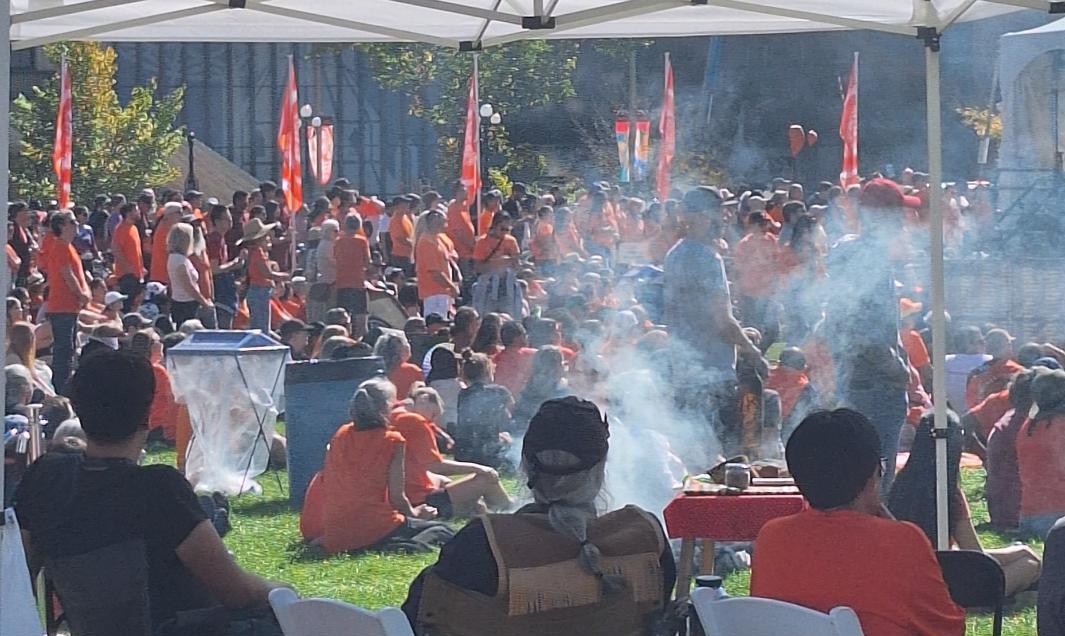
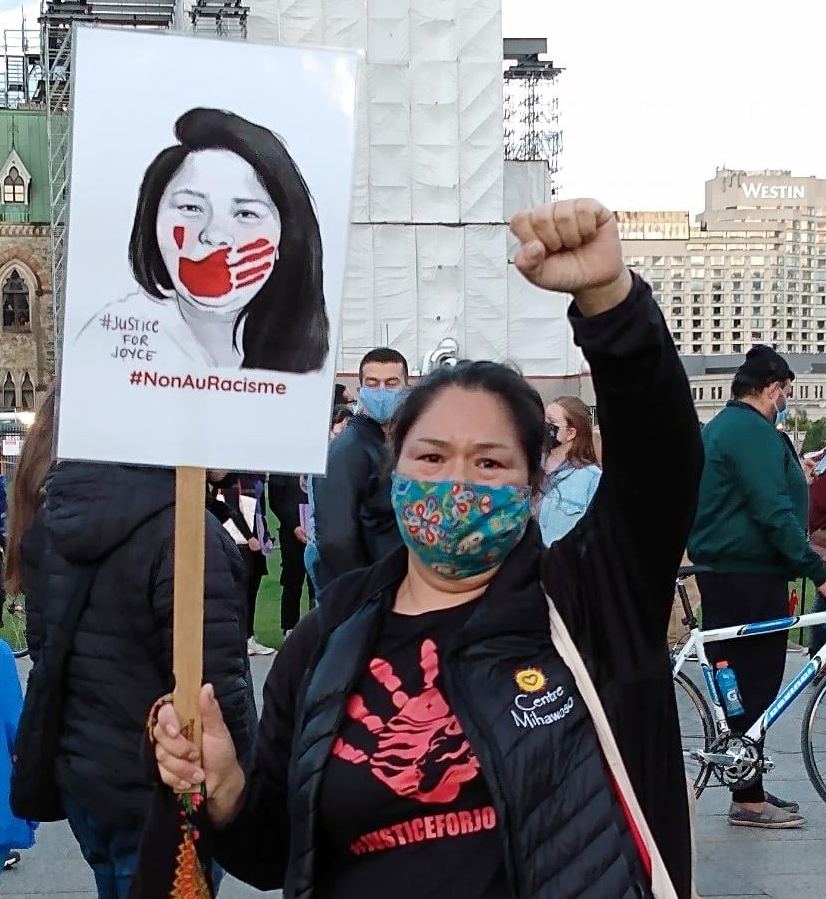
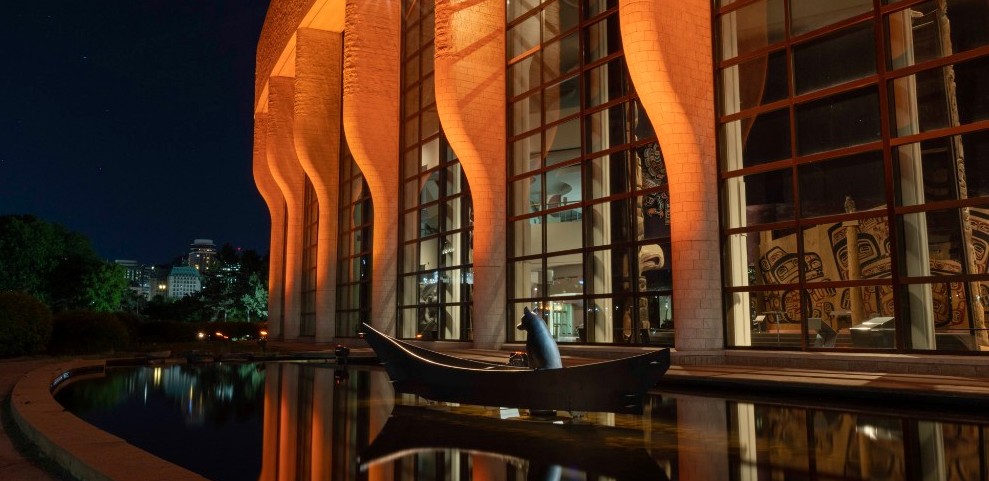
Montreal
Peterborough
Toronto
Cambridge
London
Windsor
Timmins
Winnipeg
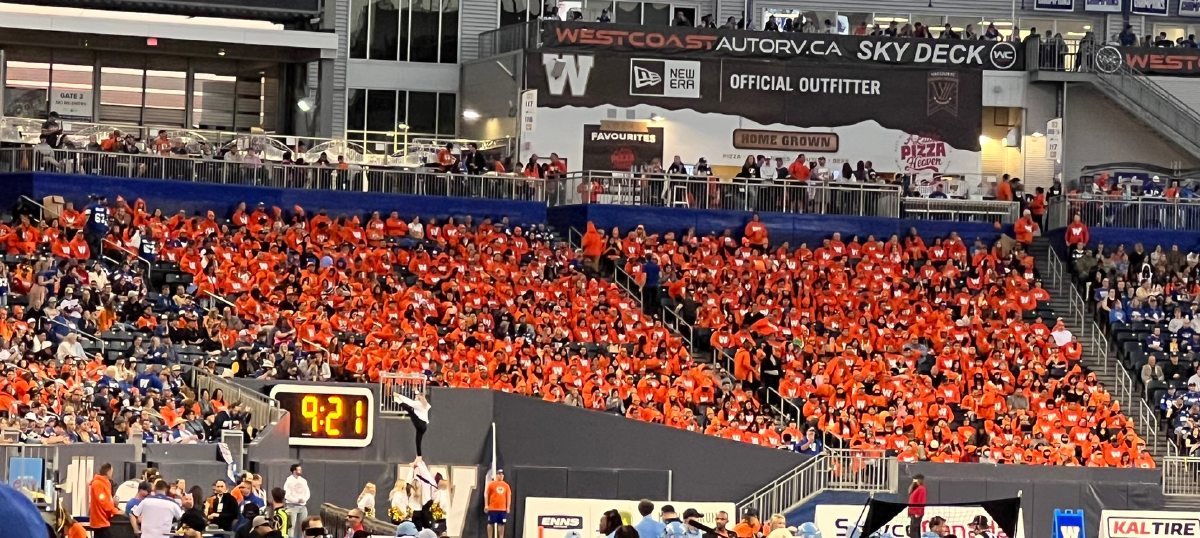
Saskatoon

Regina
Calgary
Edmonton
Stony Plain
Vancouver
Surrey
Victoria
Port Alberni
Campbell River
Sechelt
(Photos: TML, J. Brake, Y. Durocher, St. Benedict School, Island Public, J. Donkersgoed, atlohsa, G. Pirie, M. Pahl, Dan Jet Fans, iiamjamieox, J. Bowes, K. Kay, P. Nichol, The Raven, W. Grant, Coast Meridian, D.R. Ross, K. Maximick, Claire from YVR)
Third Anniversary Vigil
Remembering and Honouring Joyce Echaquan


September 28 marked the third anniversary of Joyce Echaquan's death in a hospital in Joliette, Quebec, after she was denied needed medical care, at least in part due to racist stereotyping. Joyce was from the Atikamekw community of Manawan.
Actions were organized across Quebec to commemorate her death, including in her community in Manawan, as well as in Quebec City, Trois-Rivières and Montreal, amongst others.
Montreal's action took place in the form of a vigil organized by the Caring for Social Justice Collective, in conjunction with the Office of Joyce's Principle, at Place du Canada. Over a hundred people participated.
Dr. Nazila Bettache, a clinical investigator and member of the Collective, was the evening's moderator. She noted that Joyce "left a memory. Her gesture, her legacy has inspired movements for equality in Indigenous healthcare, for cultural securization, Joyce's Principle[1] and has mobilized people, institutions, entire communities and her voice continues to resonate with us." As health care providers within the Collective, she added, "We feel that it's really our duty and our responsibility to act every day to denounce racism within healthcare."
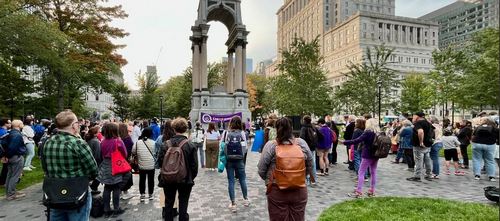
Leilani Shaw, a Mohawk from Kanhnawake and Interim Executive Director of the Montreal Indigenous Community Network, informed about her organization's work, which "encompasses various aspects of Indigenous well-being", with a focus on safe access to healthcare services.
A study undertaken by her organization in 2012 on the health needs of urban Indigenous peoples, she explained, "revealed stressing but unsurprising results" such as that "Indigenous community members face discrimination based on their origin, social class and language when seeking healthcare services. This, she added, "prevents many from seeking the care that they so desperately need. Mental healthcare and addiction are significant concerns" as is the "lack of cultural sensitivity" with many yearning "for traditional healing services," which barriers render inaccessible.
Her organization undertook a second recent research study, "a very comprehensive community plan" focused on "the safety, well-being and belonging" of Indigenous peoples "through the lens [of] and with Indigenous youth." "Finding a home here and a sense of belonging in this urban landscape is vital for our well-being and our survival. We must feel at home not only in this land, but within the institutions that should provide [for] our basic needs. This is why Joyce is so important."
She added that Joyce's "determination led to calls for cultural sensitivity, policy changes, increased Indigenous representation and accountability within the healthcare system.
In 2020, the Network "became a partner and a chair in the Montreal Indigenous Health Advisory Circle where we advocate for system changes" "to begin transforming the system that has historically harmed our people." Its priorities are to "continue to develop new practices providing holistic and culturally safe healthcare; addiction treatment and social housing."
Mathieu Robertson, an Atikamekw and a ‘navigator' with Doctors of the World who works on the street with the homeless, said he is often called upon to walk the hallways of hospitals and see trauma close up. He added that he was "really touched" by Joyce's story, which "shone a light on the need for Indigenous persons to be involved in care."
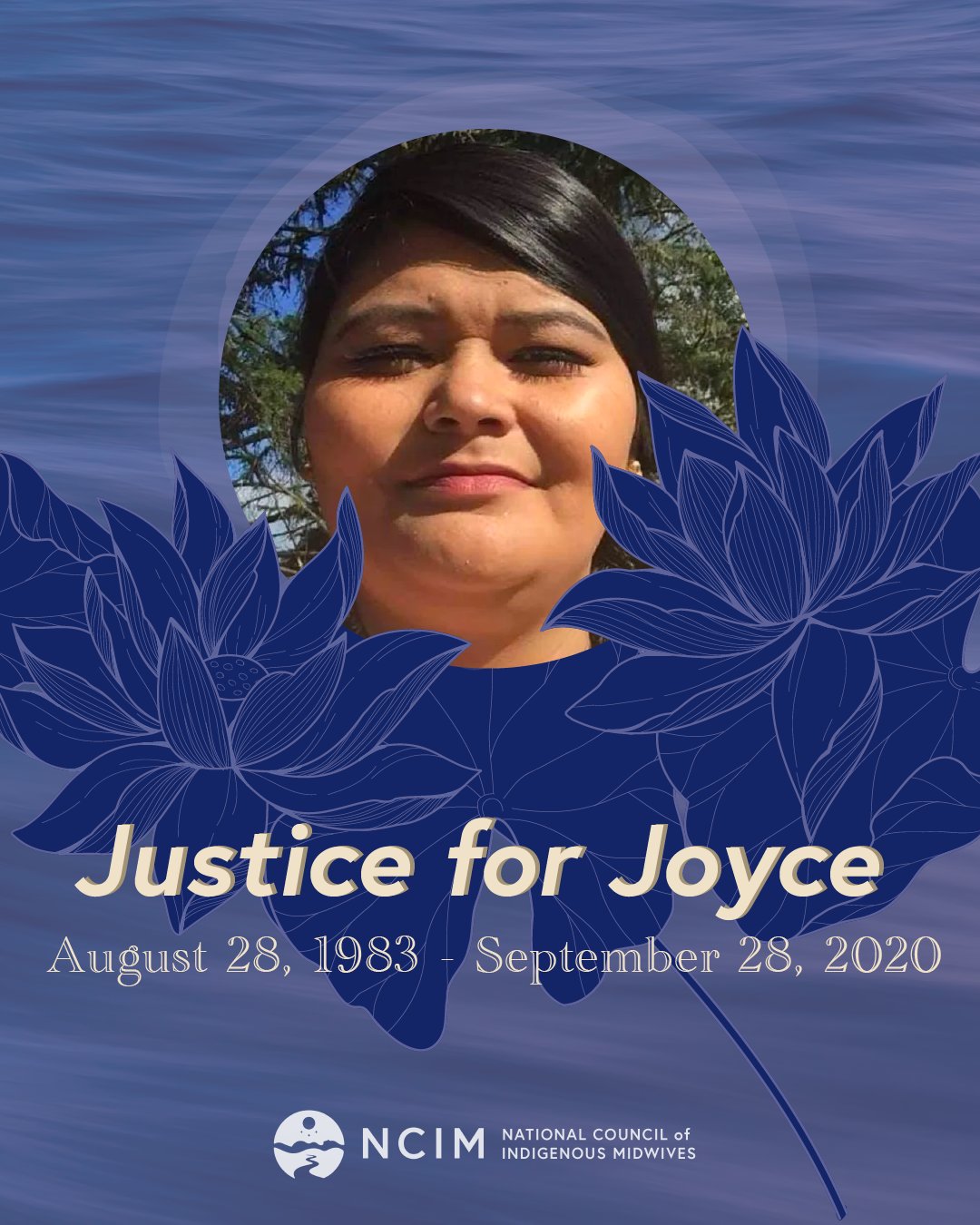 Navigation work,
he informed " is about accompanying Indigenous homeless people
in
healthcare, ensuring that they are provided safe care", which he
pointed out "is much broader than simply the medical profession"
"and
begins with accompaniment, along with care. It's an ensemble
that we
attempt to consider." He spoke about feeling privileged to be
working
with Indigenous partner organizations "working for the
community, for
those who are the most vulnerable", alongside "allies within the
system. Without them, our work would be a lot more difficult."
Navigation work,
he informed " is about accompanying Indigenous homeless people
in
healthcare, ensuring that they are provided safe care", which he
pointed out "is much broader than simply the medical profession"
"and
begins with accompaniment, along with care. It's an ensemble
that we
attempt to consider." He spoke about feeling privileged to be
working
with Indigenous partner organizations "working for the
community, for
those who are the most vulnerable", alongside "allies within the
system. Without them, our work would be a lot more difficult."
Lucie-Catherine Ouimet, a primary care nurse practitioner from Mitchikanibikok Inik [Algonquin Barriere Lake First Nation, now called Rapid Lake], explained that she works with Doctors of the World and the Native Friendship Centre, the entire Indigenous navigator team, the mobile clinic as well as many other collaborators and organizations. This collaboration, she explained, " makes for a safe and less stressful environment, one which is much more adopted [...] to the reality of our brothers and sisters living on the street.
"What I try to do as a healthcare professional [is to integrate] our traditional knowledge, our ancestral legacy that is every bit as valid."
"Although there's still a way to go, there's a momentum there which we must try not to stop and what I think is key is to recognize that there are other ways of looking at health, through its emotional, spiritual, physical and cognitive aspects."
Note
1. "Joyce's Principle aims to guarantee to all Indigenous people the right of equitable access, without any discrimination, to all social and health services, as well as the right to enjoy the best possible physical, mental, emotional and spiritual health.
"Joyce's
Principle requires the recognition and respect of Indigenous
people's
traditional and living knowledge in all aspects of health."
(Photos: TML, N. Stake-Doucet, National Council Indigenous Midwives)
End Illegal Mining and Resource Extraction in Northern Ontario!
Thousands Rally at Queen's Park to Demand Ford Government Respect Indigenous Peoples' Jurisdiction
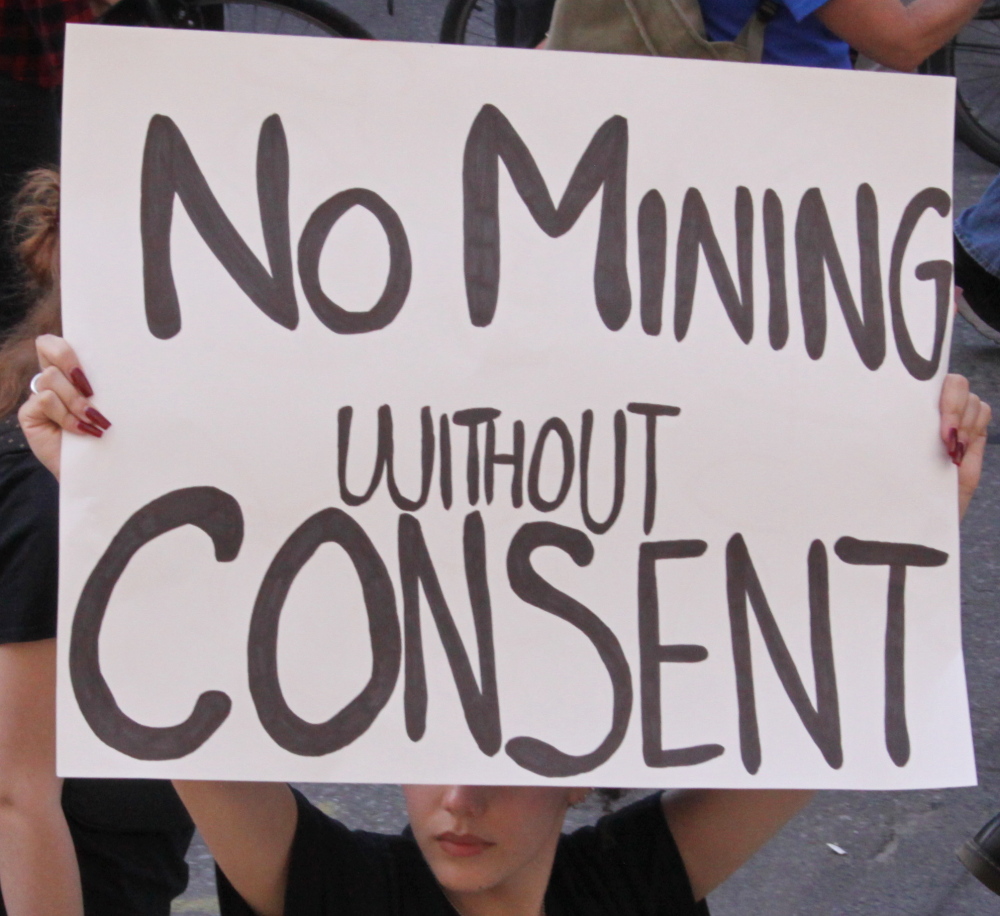
The previous day, the Chiefs and representatives from Asubpeeschoseewagong (Grassy Narrows First Nation), Kitchenuhmaykoosib Inninuwug (Big Trout), Muskrat Dam, Neskantaga and Wapekeka First Nations, who earlier in the year created the Land Defence Alliance as a united force to defend their interests, sought a one-on-one meeting with Premier Ford to get him to sign a declaration that no more mining and other activities will proceed in their territories without their consent. The Premier refused to meet with them.
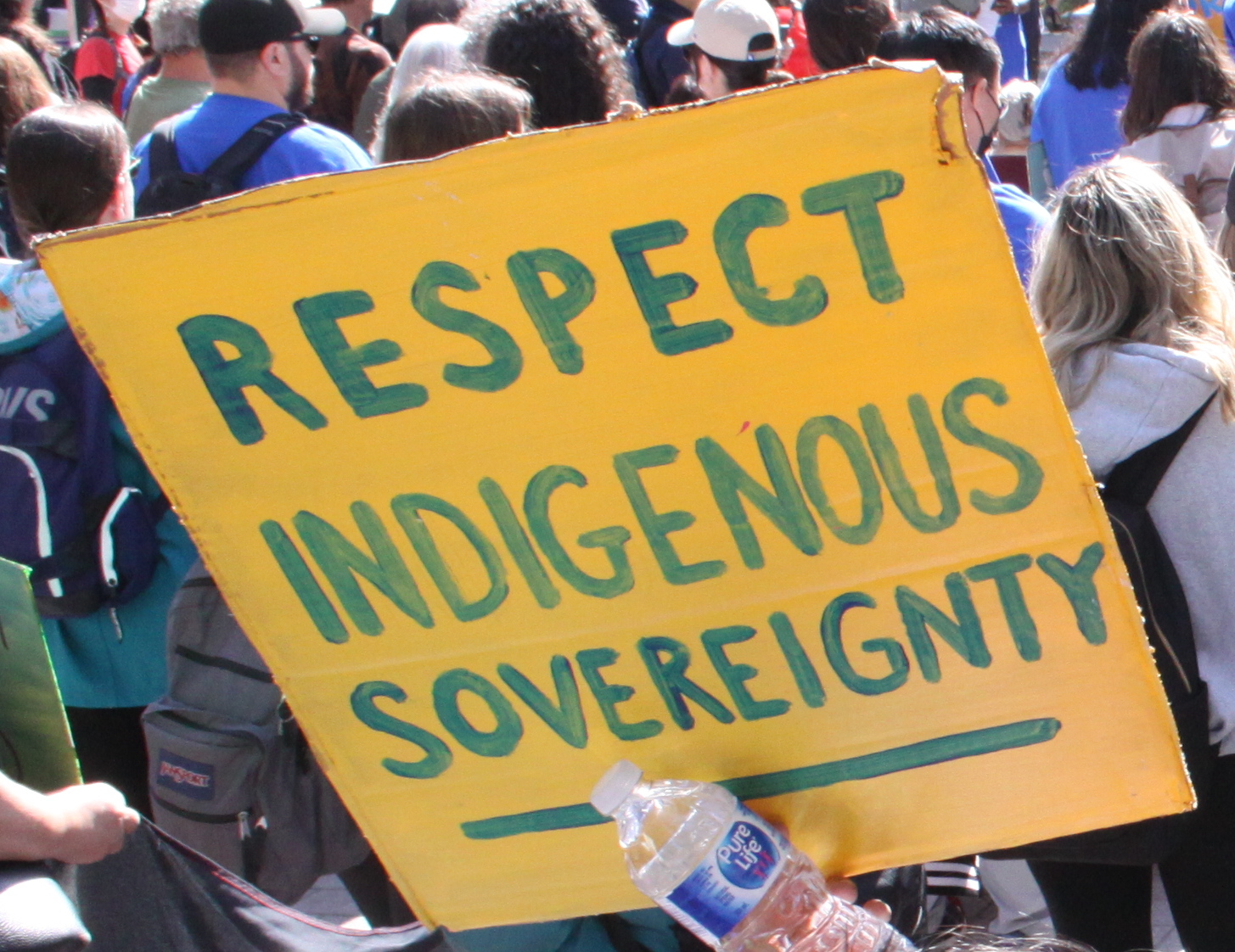
Hundreds of people along the route of the march, from Grange Park to the legislature at Queen's Park, expressed their support for the action with some joining in.
At Queen's Park more speeches were given. One of the speakers was Cecilia Begg, a band counselor from Kitchenuhmaykoosib Inninuwug, who thanked everyone for their support and noted that several youth from their community had travelled to Toronto for the action. She said that the next generation are taking up their social responsibility to defend the land and waters which the people had depended on for their being for thousands of years.

Chief Moonias pointed out that First Nations who have had mining
development in their territory remain impoverished, still have
no
housing, no jobs and no prosperity. He noted that Neskantaga
First
Nation has been under a 28-year boil water advisory, the longest
in
Canada, and nothing has been done to fix this problem. He said
that his
community is not averse to development but not without their
full
participation in it, not without their Free, Prior and Informed
Consent.
Erin Riley-Oettl, a human rights lawyer with Amnesty International, told the rally that when Bill C-15 was passed in the summer of 2021 to adopt into Canadian law the UN Declaration on the Rights of Indigenous Peoples, the principle of Free, Prior and Informed Consent was deliberately left out. It was replaced with "the right to be consulted," she said, pointing out that "Consulting is not consent. Consent is the right to say, 'No.'"
The participants ended the rally in high spirits, determined to stand together against the colonial high-handedness of the Ford government and demand that the rights of the Indigenous Peoples in Northern Ontario and across Turtle Island be respected.
Note
1. During the 1960s and early 1970s, the chemical plant at the Reed Paper mill in Dryden, Ontario, which is upstream of Grassy Narrows, dumped 9,000 kilograms of mercury into the English-Wabigoon River which has resulted in continuing health and environmental issues for the 1,000 people of Grassy Narrows First Nation. They have been demanding for more than 50 years that the federal and provincial governments must take immediate action to remedy the situation, but have been ignored.
"Search the Landfills" Nationwide Day of Action
Actions Across Country Demand Justice and Dignity for Murdered Indigenous Women
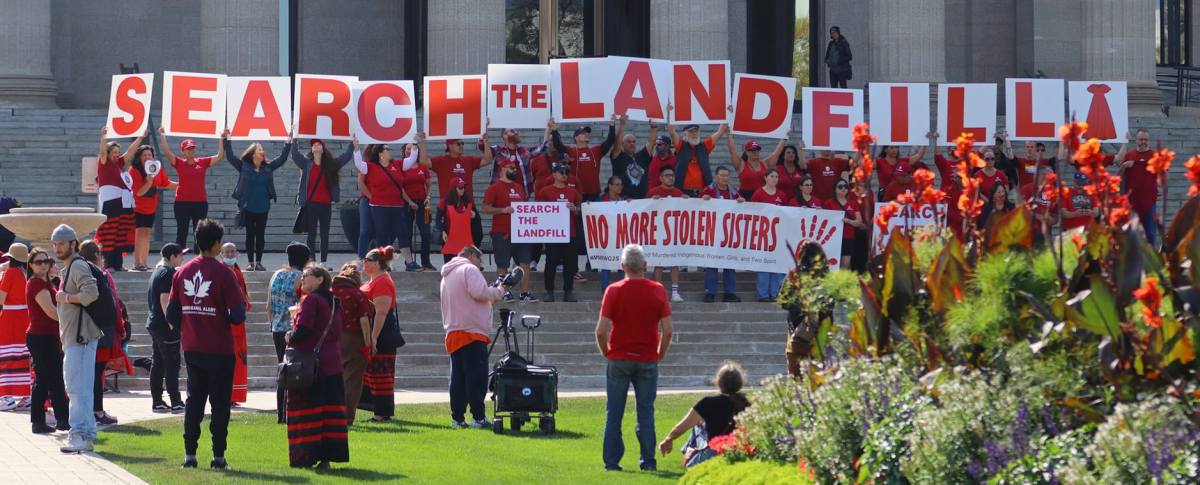
Manitoba legislature in
Winnipeg
The demand to uphold the dignity of the murdered Indigenous women from Winnipeg has won broad support across the country with the stand "Search the Landfills. Our Women Are Not Trash."
In addition to the event on Parliament Hill on September 18, rallies and marches were organized in 21 cities and towns across the country, many of them at provincial legislatures and city halls to demand governments take action to end the violence against Indigenous women, girls and two-spirited persons. Among the cities where rallies took place were Victoria, Vancouver, Terrace, Prince George, Edmonton, North Battleford, Winnipeg, Timmins, Toronto, Ottawa, Montreal, Charlottetown, and Halifax.
Members of the families of the two murdered Indigenous women, Morgan Harris and Marcedes Myran, whose bodies are believed to have been dumped in the Prairie Green landfill north of Winnipeg, attended the rallies in Montreal and Toronto as well as on Parliament Hill.
Montreal

On the evening of September 18, over a hundred people in Montreal assembled at Place du Canada. The event was hosted by the Native Women's Shelter of Montreal's Iskweu Project, aimed at reducing and ultimately ending the violence against Indigenous women and girls.
Longtime activist and human rights defender Kanehsata'kehró:non Ellen Gabriel was the first to speak, welcoming the families of two Indigenous women from Winnipeg who are believed to be buried in the Prairie Green landfill, "who the government callously disregards."
"We talk about colonialism that is continuing, but also the genocide," she said, noting that the UN Declaration of Human Rights "talks of dignity. We are all equal in dignity and worth. And that's not the message that has been given to us by [...] all levels of government." She said "It talks about 'barbarous acts,' about 'genocide.' The Premier of Manitoba's refusal to respect the dignity of Indigenous women who have been murdered is a barbarous act.
"We are still fighting racism at the highest level of governments [...] of society," she said, adding that "Until Canada stops implementing its genocidal policies ... we're going to have to come together like this again."

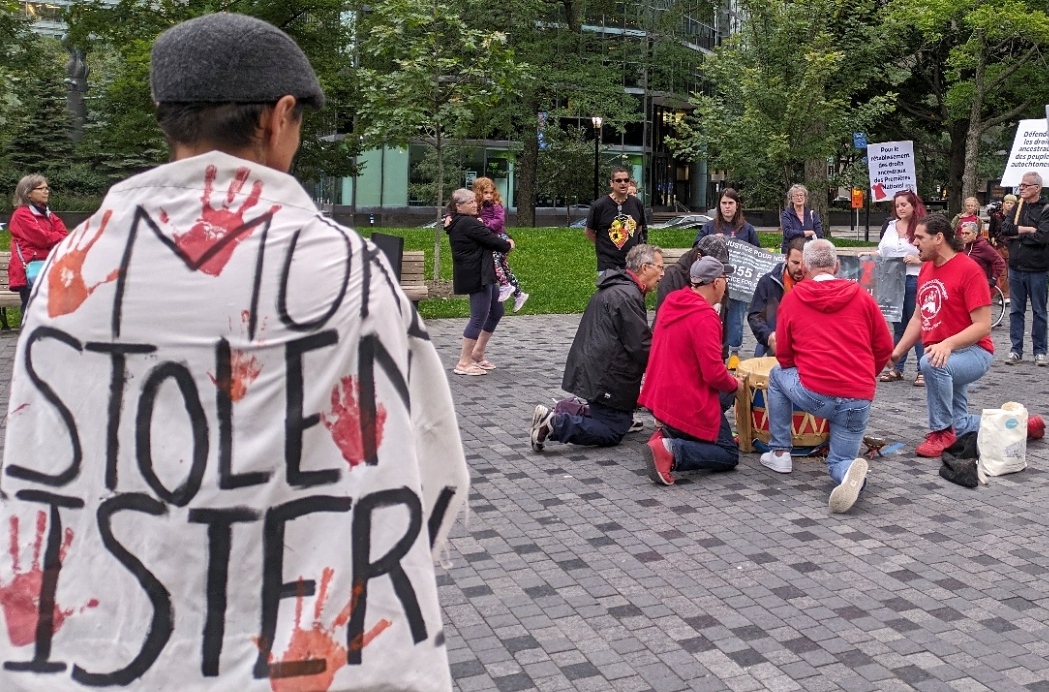
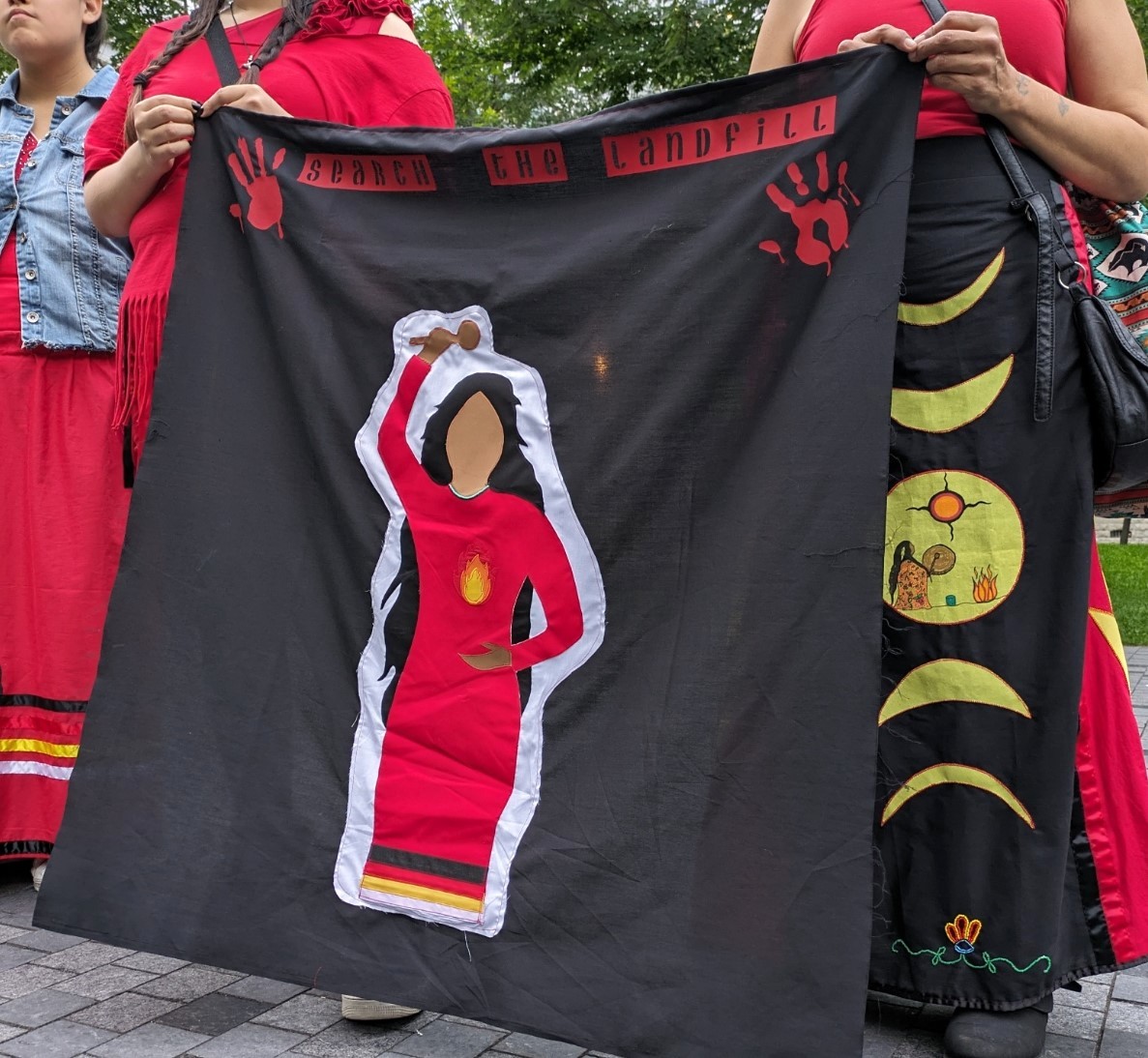
Cambria Harris, Morgan Harris' twenty-two year old daughter spoke of finding "strength in numbers," saying "The more that we gather and the more we talk about this, the more our voices will be heard and we're slowly realizing that it is happening." She called on everyone to use their voice for the voiceless. She spoke of a system which "was made quite literally to break us as Indigenous Peoples. It was made to strip us of our land, of our culture, of our language and you're still seeing the effects of colonization today and how it still continues."
"So why aren't all levels of government being held accountable for the lack of actions and change ... as with the decision to not search the landfill?" she asked, adding "Indigenous women are not garbage. We are the matriarchs of our society. We are the backbones of our nation and we always will be. We are the sacred water carriers. We carry that beautiful life within us for 9 months ..."
She ended by saying that "this is not an Indigenous Peoples' problem" but "Canada's problem" and that this is happening "across Turtle Island, everywhere, no matter where you go. It just happens that Winnipeg is the epicentre for missing and murdered Indigenous women and girls." In 2022 alone, she said, over 9,000 missing person reports were filed in Winnipeg and there were 53 homicides, a large majority of them Indigenous women.
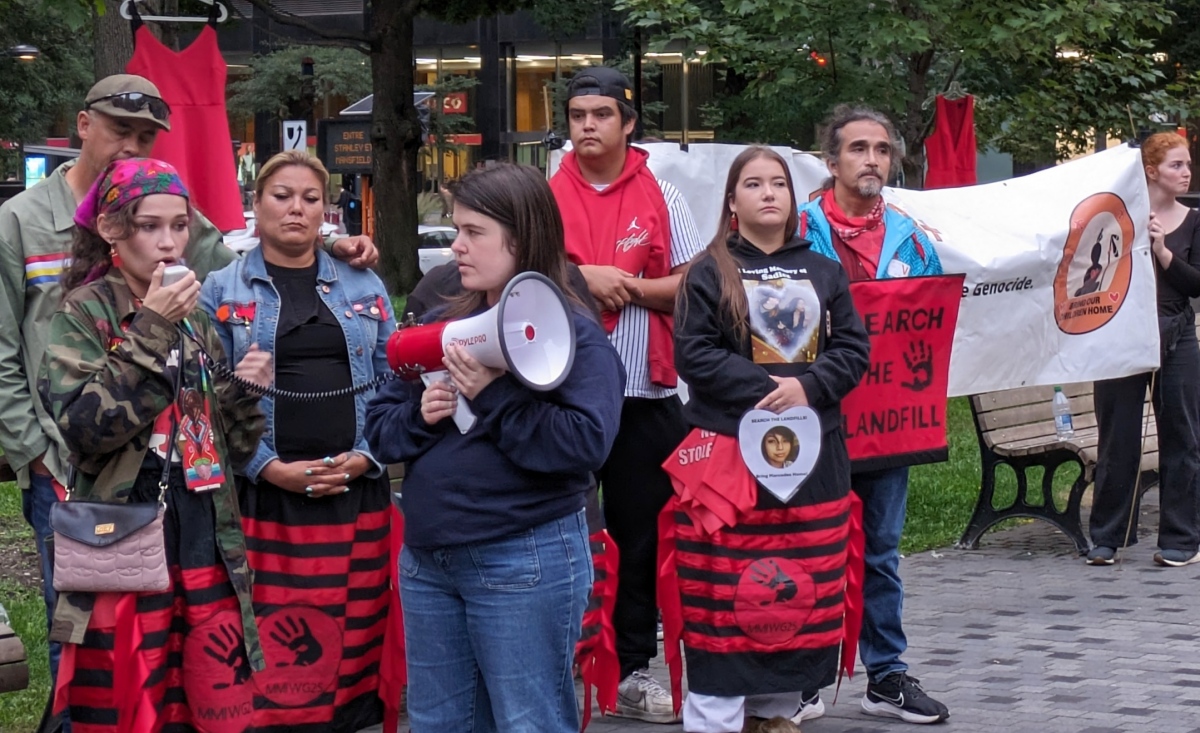
Melissa Robinson, a member of Morgan Harris' family, said: "When we talk about the government trying to break us down, [...] they're not going to be successful." She said, "We are not going to stop. ... Our women are going to be brought home, not only in Winnipeg, but all of our missing Indigenous women across Turtle Island."
Participants left the event more resolved than ever to seek that broad public support so badly needed for the crimes committed against Indigenous women, girls and the two-spirited and all Indigenous Peoples to truly be made a thing of the past.
Toronto
On September 21, in Toronto, close to 100 people marched from the Native Canadian Centre to the Ontario legislature at Queen's Park to demand that the Prairie Green Landfill be searched for the remains of Marcedes Myran and Morgan Robinson.
 Participants
chanted slogans such as "Search the Landfill," "Bring Our
Sisters Home"
and "No Pride in Genocide." All along the route, many people in
cars
and on foot expressed support by honking their horns and raising
their
fists. The participants filled the intersections at College and
Spadina, and then at College and University, where songs and the
sound
of drums filled the air and participants joined in round-dances.
Participants
chanted slogans such as "Search the Landfill," "Bring Our
Sisters Home"
and "No Pride in Genocide." All along the route, many people in
cars
and on foot expressed support by honking their horns and raising
their
fists. The participants filled the intersections at College and
Spadina, and then at College and University, where songs and the
sound
of drums filled the air and participants joined in round-dances.
Members of the families of the murdered women participated in the march and rally. At Queen's Park, Jorden Myran, Marcedes Myran's sister, expressed anger and disappointment at the lack of action by all levels of government to search the landfill for her sister and the other victims and bring them home so that they can be properly honoured and buried. Cambria Harris, Morgan Harris' daughter denounced the racism and colonial attitude of the Canadian state which continues to treat the murdered women as garbage and not human beings worthy of respect. She expressed appreciation for the growing support from the people of Toronto and across Canada for the landfill to be searched.

Chief Kyra Wilson of the Long Plain First Nation in Manitoba also spoke at Queen's Park. She observed that Canadian state governments at all levels are not taking the issue of Murdered and Missing Indigenous Women and Girls seriously as evidenced by the callous disregard and foot-dragging in response to the pleas of the murdered women's families to have the landfill searched. She said that the search of the landfill will happen one way or the other and if the Canadian government is not willing to do it, then the Indigenous people will. She also emphasized that other landfills around Canada may also hold the remains of murdered and missing Indigenous women and girls.
The speakers expressed thanks to everyone who was there and noted that they also received strong support at rallies earlier in the week in Ottawa and Montreal, and that this support and love is decisive in their quest for justice.
St. Catharines
Winnipeg

Camp at Brady landfill
Edmonton
The day was cool and grey as hundreds gathered at the Alberta Legislature grounds for the National Day of Action to Search the Landfill but red dresses radiated intensely, and the hill bustled with activity. Red dresses were placed over placard stick frames, hung as if on crosses. Young people lined up to have their faces painted, most choosing the red hand graphic over their mouth. Chubby Cree began to drum.
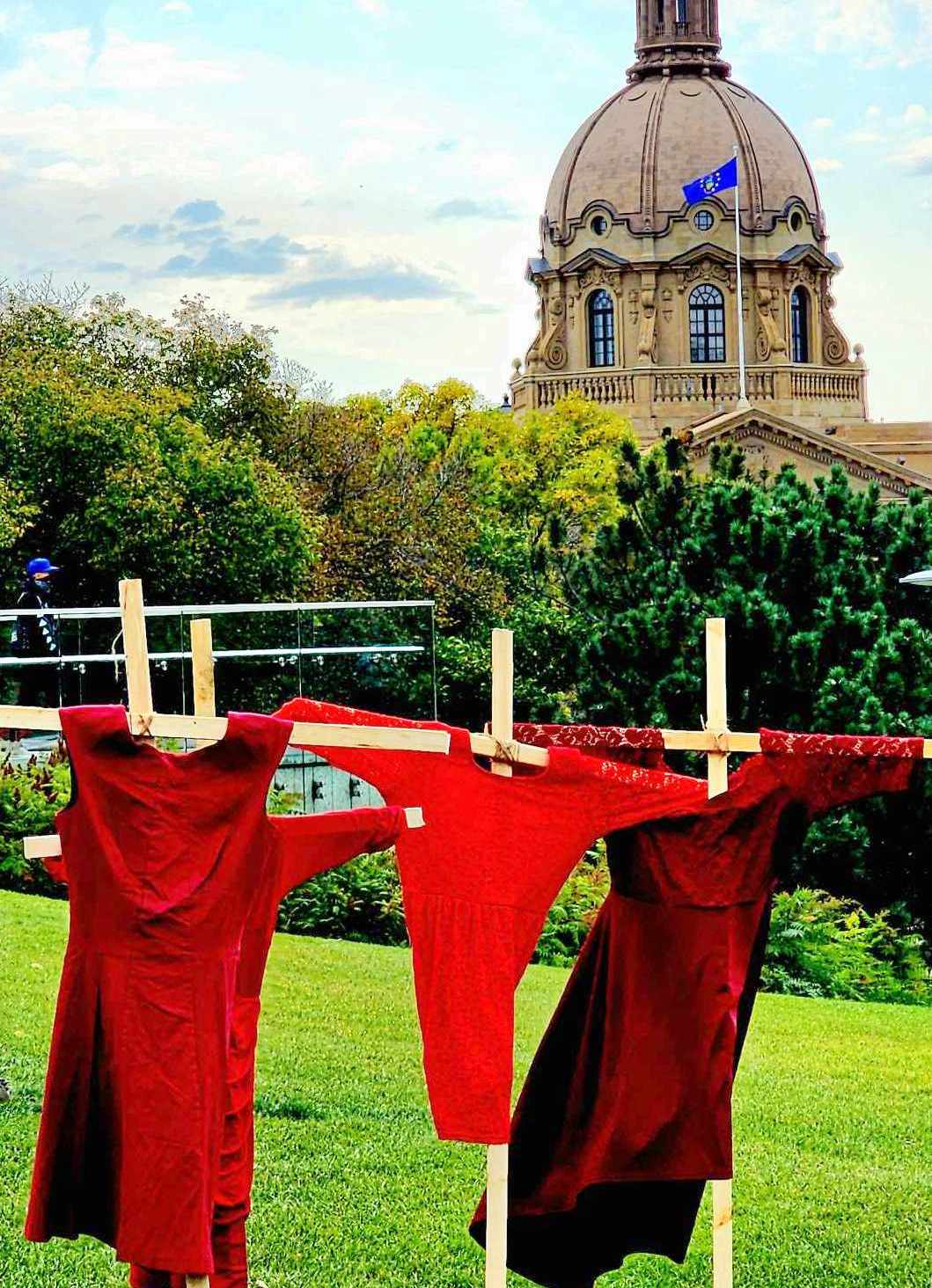 Kokum Kathy
Hamelin gave a prayer in Cree, then in English and as she
finished, she
thanked the creator for just then letting the sun out. It blazed
as she
announced the walk would proceed east to the Shaw Conference
Centre,
where the Safety For Our Cities conference organized by the
Edmonton
Police Services was taking place. She asked the crowd: sidewalk
or
roadway? The crowd answered: Roadway!
Kokum Kathy
Hamelin gave a prayer in Cree, then in English and as she
finished, she
thanked the creator for just then letting the sun out. It blazed
as she
announced the walk would proceed east to the Shaw Conference
Centre,
where the Safety For Our Cities conference organized by the
Edmonton
Police Services was taking place. She asked the crowd: sidewalk
or
roadway? The crowd answered: Roadway!
Organizer Judith Ann Gale announced that she had just been informed of Justin Trudeau's refusal to intervene and order the recovery, claiming the landfill is out of his jurisdiction. The response to the abuse of family invited to Ottawa for more empty talk and rebuff was palpable. She pointed out that the Geneva Conventions require that the dead in both international and non-international conflicts be provided a dignified burial. Under conditions of state-organized violence and genocide, this law applies to murdered and missing Indigenous women, girls and two-spirited people, and Canada must uphold its obligations, she said.
Many women from Edmonton have travelled to Winnipeg to spend time at the encampments – Camp Morgan and Camp Marcedes. They spoke of their experience, of what they learned, of the pain and sorrow of those who have lost loved ones, the strength and healing which comes from standing and acting together, and the tremendous resolve to continue until the search is carried out. Speakers emphasized that we are one. This is everyone's concern and everyone has a place and everyone's voice is needed in speaking out and taking action to end the conditions in which genocide of MMIWG2S continues.
Everyone then took to the streets, proceeding to the Convention Centre where a lively rally took place.
Say their names -- Morgan Harris, Marcedes Myran, Tanya Nepinak and Mashkode Bizhiki'ikwe or Buffalo Woman!
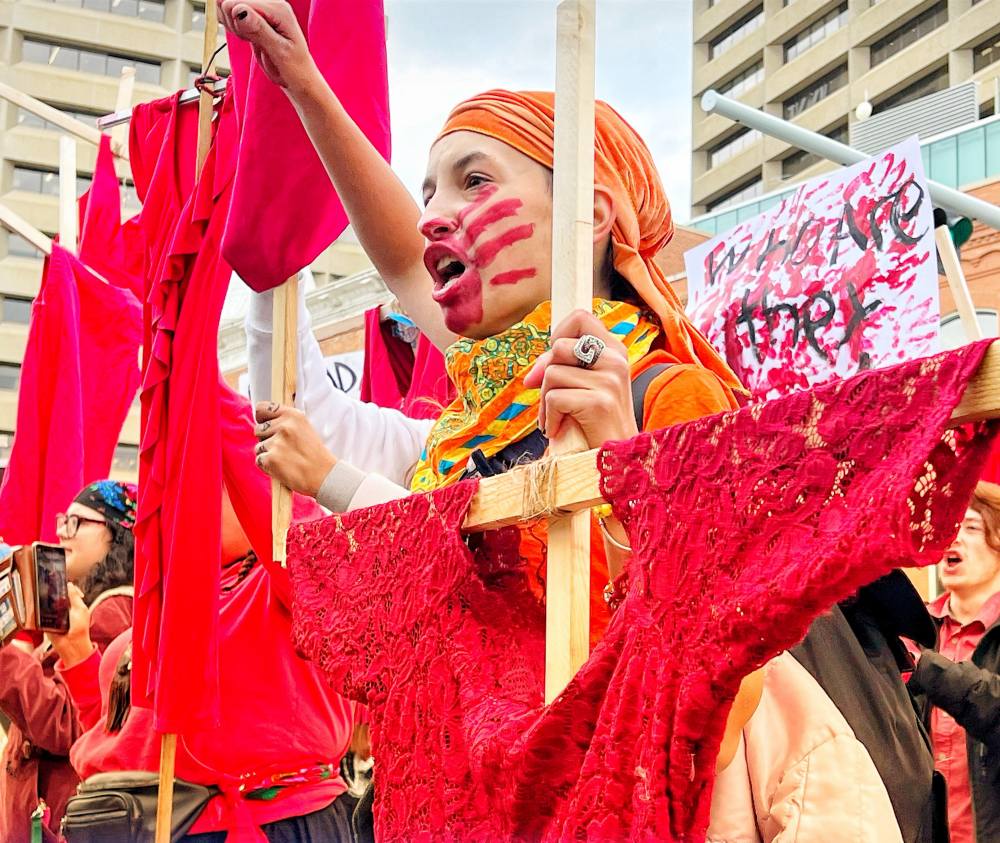
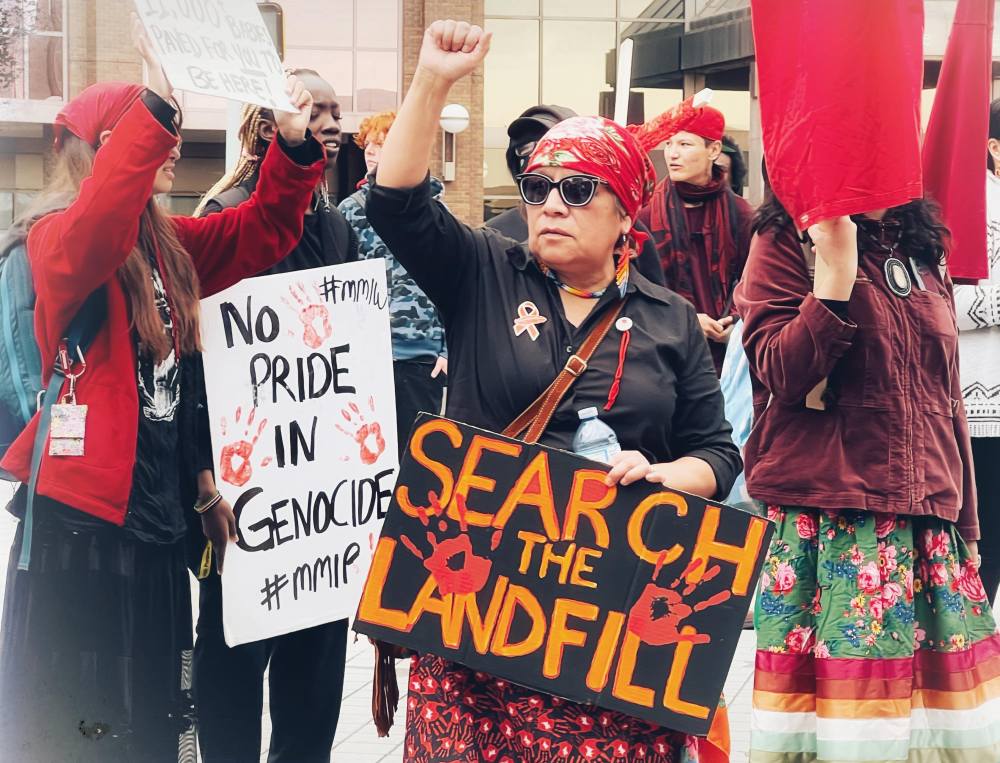
Prince George
On September 15, First Nations elders, family members, local organizations and advocates, all came together in a display of collective strength to demand action to end the unjust and completely unacceptable situation faced by so many Indigenous women, girls, men, boys and two-spirited people. Personal stories, drumming, singing, chants and discussion amongst participants reflected the growing community voice in northern BC calling for justice for all MMIWG2S+ and for landfills in Winnipeg to be searched so that the women known to be there are returned to their families and communities.
Victoria


Charlottetown
(Photos: TML, Assembly of Manitoba Chiefs, C. Peters, D. Driedger, J.O. Smith, M. Troin, Standing Bear Network, M. Graeme, T. Murphy)
Rally on Parliament Hill as Fall Session Begins
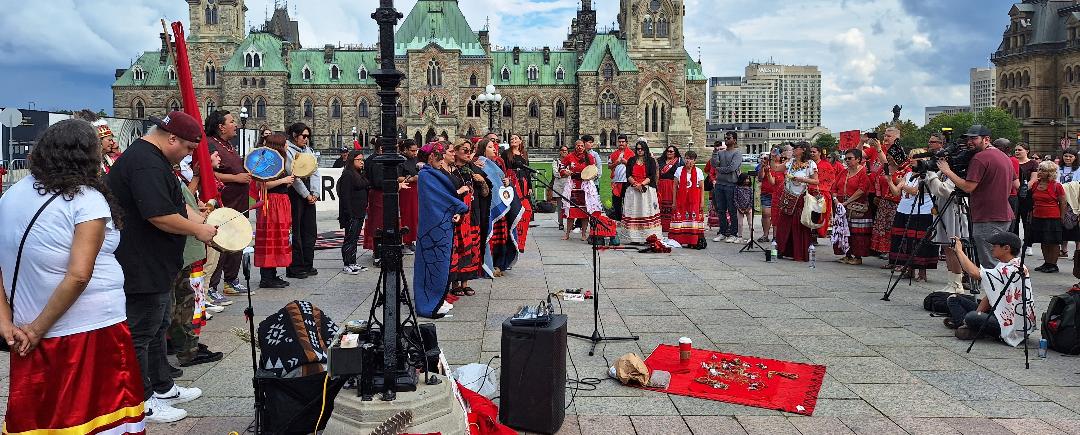
Hundreds of people gathered on Parliament Hill in Ottawa on Monday, September 18, to honour missing and murdered Indigenous women and girls and two-spirited persons and to demand that two Winnipeg landfills be searched to bring four sisters in spirit home. They are Morgan Harris, Marcedes Myran, Tanya Nepinak and one yet to be identified referred to as Mashkode Bizhiki'ikwe [Buffalo Woman].
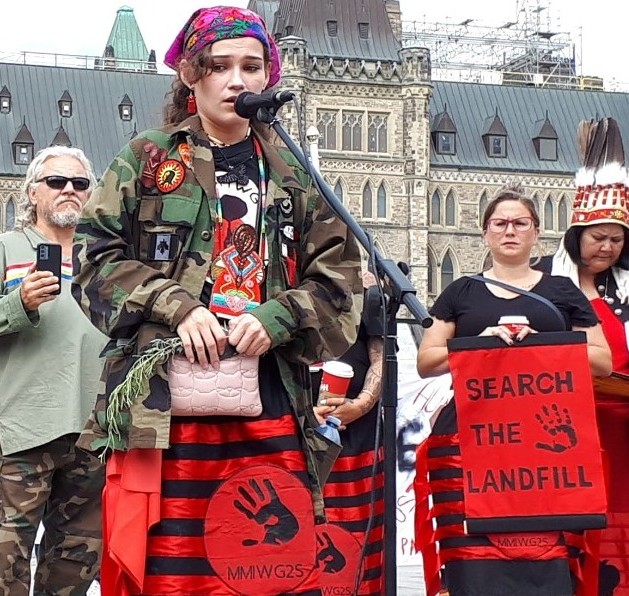 Cambria, the
daughter of Morgan Harris put the problem at hand succinctly.
"It's a
sad statement when we have to gather like this to have our
voices heard
in such a matter of basic human dignity," she said.
Cambria, the
daughter of Morgan Harris put the problem at hand succinctly.
"It's a
sad statement when we have to gather like this to have our
voices heard
in such a matter of basic human dignity," she said.
She and family members of Marcedes Myran as well as Manitoba Grand Chief Cathy Merrick of the Assembly of Manitoba Chiefs, Long Plain First Nation Chief Kyra Wilson, and others, were invited to meet with the Minister of Crown-Indigenous Relations on September 18. Cambria decried the meeting pointing out that besides being retraumatized, they were told that more questions on the feasibility of the search needed to be answered before anything could be done. When asked, "What questions?" the Minister could not say.
The Manitoba government has refused to pay for the search, citing safety issues and the Assemblies have been asked for "feasibility studies," which the Assembly of Manitoba Chiefs has provided. Cambria's response underscored the brutality of government stalling behind the veneer of doing its duty. She said: "Nowhere in Canada, in the U.S. or elsewhere in the world has a family been asked to present a feasibility study to prove their loved-one is worth finding."
"Each level of government, not just provincial, but federal and municipal, has a role in retrieving these women. My mother's treaty rights are being violated. She needs a proper burial, a proper ceremony, she's stuck between this world and the spirit world because she doesn't have a proper burial," Cambria said. "Why are all levels of government beating around the bush and pointing fingers at one another because they can't figure out how to search the landfills among themselves. We have figured it out, we did the feasibility studies, we have proven that my mother is worth searching for. If the government does not, then the community will go and retrieve my loved-ones," she said.
"To leave Indigenous women in a dump sets a precedent that if any one of our members goes missing, they will not consider for a second to go looking for us," Cambria said. "This contributes to the normalization of Indigenous genocide. This problem is not strictly Indigenous, it is a problem which concerns Canadians as a whole," she concluded.
Cambria, along with other members of the community, set up Camp Morgan in December 2022 near the Brady landfill to demand that it be searched. As of September 18 the camp had been maintained for 274 days. In July they set up a second camp, Camp Marcedes, next to the Canadian Museum for Human Rights.
Morgan Harris' aunt, Melissa Robinson, said: "We're not going to accept no for an answer, we're going to keep fighting and pushing for all our women right across Turtle Island, all the landfills are going to be searched and everyone is going to come home. Even after death, we owe that much to our women. They deserve that dignity, that proper burial. I will not go to my death knowing I have a family member, my young cousin Morgan, laying in a landfill. If it comes down to us doing the work, then we're going to do it. Like my niece Cambria said, give us the shovels, we'll go in, we'll do it, we will bring them home."

Speaker after speaker spoke from the heart saying this is an issue which concerns the entire Canadian polity. As they spoke, the parliament buildings loomed eerily, almost ominously, in the background. It was hard to fathom that the first day of the fall sitting of Parliament was taking place inside, and that a matter the government has sworn its commitment to -- the murdered and missing Indigenous women and girls -- was not on its agenda.
Last fall, all the parties sitting in Parliament had an historical opportunity to adopt a motion that MPs stop swearing allegiance to the king of England, the very symbol of British colonial racism and genocidal acts against the Indigenous Nations. The Liberals and Conservatives in particular vociferously opposed the motion saying they had more immediate priorities and that constitutional order was the most important thing to preserve. They categorically refuse to discuss matters of concern to the people while they try to cover up that they are complicit in perpetuating the colonial order that permits such atrocities as women and girls being murdered and thrown into landfills.
Canadians from all walks of life demand justice for the families of murdered and missing Indigenous women and girls and two-spirited people.
It Can Be Done!
Search the
Landfills!
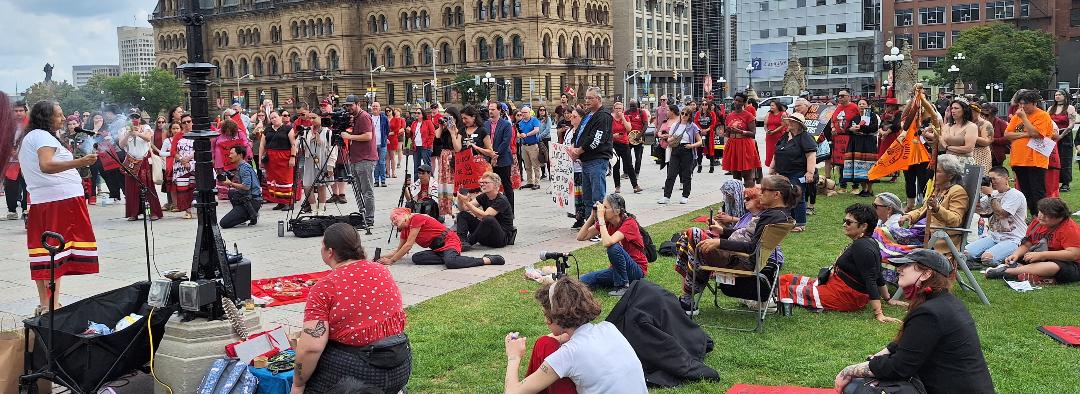
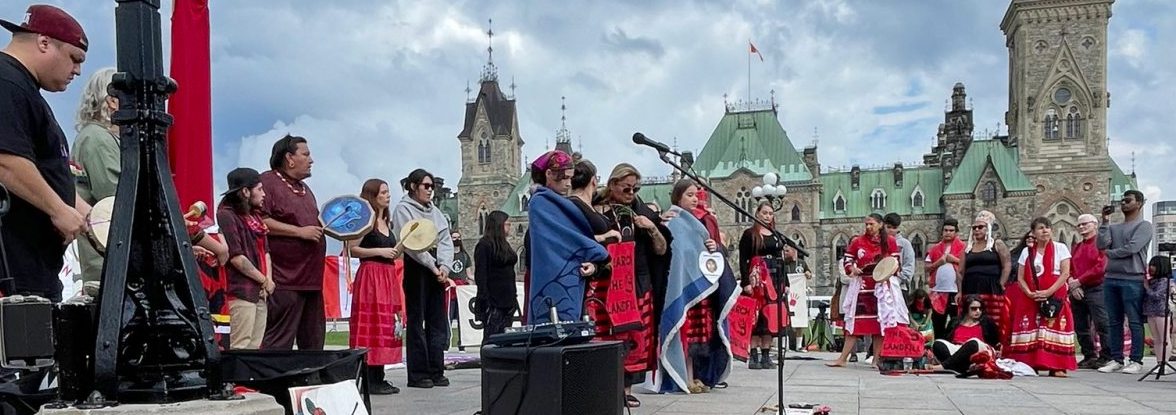


(Photos: TML, Peace Brigades International, L. Gazan, D. Deby, B. Hendry)
(To access articles individually click on the black headline.)
Website: www.cpcml.ca Email: editor@cpcml.ca

 Squamish, October
4, 2023
Squamish, October
4, 2023 


